Email all work for the course to me at [email protected]
NO KNOWLEDGE OF FRENCH IS REQUIRED FOR THIS COURSE. A Desire to Learn Is Required for this Course.
Proust is often funny, really humorous:
“Everybody calls ‘clear’ those ideas which have the same degree of confusion as his own.”
Let's listen to the most famous passage in the novel:
Remembrance Of Things Past by Marcel Proust / Tom Hiddleston / Words and Music: Memory
Le petites madeleines / The little madeleines (a madeleine is a kind of cookie taken with tea)
Now let's LISTEN to John Rowe's audiorecording on Audible.com

Some Questions:
1. What does "lost time" mean in the title In Search of Lost Time?
What is the final word of the novel? Can you guess? Time!
A character in Proust's novel, namely, the narrator says:
"And if, after so many years and so much lost time, I felt the stirring of this vital pool within humanity even in international relationships, had I not apprehended it at the very beginning of my life when I read one of Bergotte’s novels in the Combray garden and even if today I turn those forgotten pages, and see the schemes of a wicked character, I
cannot lay down the book until I assure myself, by skipping a hundred pages,
that towards the end the villain is duly humiliated and lives long enough to know
that his sinister purposes have been foiled. For I could no longer recall what
happened to the characters, in that respect not unlike those who will be seen this
afternoon at Mme de Guermantes’, the past life of whom, at all events of many
of them, is as shadowy as though I had read of them in a half-forgotten novel."
This is Proust recalling a passage in Swann's Way, the first novel, toward the end of Finding Time Again (aka Time Regained aka Time Recaptured), the last of seven novels that make up the Recherche.
Or you could follow an analogy or other kind of comparison such "as though." Or butterflies as metaphor and simile in Flaubert's Madame Bovary.
The novel as a palimpsest of the narrator's experiences, memories of them, involutary memories, forgotten memories, and so on.
The smallest facts, the most trivial happenings, are only the outward signs of an idea which has to be elucidated and which often conceals other ideas, like a palimpsest.
--Proust, The Guermantes Way
Here is the last sentence of the novel:
Therefore, if enough time was left to me to complete my work, my first concern would be to describe the people, even at the risk of making them colossal and unnatural creatures as occupying a place in far larger than the very limited one reserved for them in space, a place in fact almost infinitely extended, since they are in simultaneous contact, like giants immersed in the years, with such distant periods of their lives, they have lived through—between which so many days have taken their place—in Time.
2. What does a "complete incomplete" novel mean?
Proust on the incompleteness of the work of art in The Prisoner
Here's another question: Can you finish Proust's novel? And here's yet another: Is the novel complete? Did Proust finish it? (No. He died before he could.) Would Proust have ever finished it? Galley Sheets of Swann's Way.
Proust on the incompleteness of the work of art
Thus, not only is the Recherche, as Blanchot says, a "completed-incompleted" work, but its very reading is completed in completion, forever in suspense, forever "to be taken up again," since the object of that reading is constantly thrown into a dizzy rotation."
--Gérard Genette, "Proust's Palimpsest," Figures of Literary Discourse, p. 222
What is a palimpsest?
Palimpsest / Die Wand (The Wall)
Leo Bersani, “Proust and the Art of Incompletion.” in Balzac to Beckett: Center and Circumference in French Fiction.New York: Oxford UP, 1970. 192–239.
Thomas De Quincey, The Palimpsest of the Human Brain in Suspiria de Profundis
Who is Marcel Proust, what is In Search of Lost Time like, and how should we read it? Here's what Proust's narrator says in the Finding Time Again:
It is only through a custom which owes its origin to the insincere language of prefaces and dedications that a writer says “my reader.” In reality, every reader, as he reads, is the reader of himself. The work of the writer is only a sort of optic instrument which he offers to the reader so that he may discern in the book what he would probably not have seen in
himself. The recognition of himself in the book by the reader is the proof of its
truth and vice-versa, at least in a certain measure, the difference between the two
texts being often less attributable to the author than to the reader. Further, a book
may be too learned, too obscure for the simple reader, and thus be only offering
him a blurred glass with which he cannot read. But other peculiarities (like
inversion) might make it necessary for the reader to read in a certain way in
order to read well; the author must not take offence at that but must, on the
contrary, leave the reader the greatest liberty and say to him: “Try whether you
see better with this, with that, or with another glass.”
3. Why is Proust so long?
The use of three options Proust's author gives the reader in that last sentence above--
"with this, with that, or with another glass”
--is very Proustian. (However, notice that in this example, Proust doesn't differentiate between the three glasses.)
Proust uses phrases like "or perhaps" several times in one sentence.
"Since [Leo] Spitzer, critics have often noted the frequency of those
modalizing locutions (perhaps, undoubtedly, as if, seem, appear). . . .
When the narrative offers us, introduced by three perhaps's, three explanations to
choose from for the brutality with which Charlus answers Mme.
de Gallardon, or when the silence of the elevator operator at
Balbec is ascribed with no preference to eight possible causes,
we are not in fact any more "informed" . . . .
--Gérard Genette, Narrative Discourse, p. 203
Look for syntatic repetition; Proust will repeat the same words at the beginning. “Perhaps it was because . . . . ; or perhaps . . . . ; or perhaps . . . ; or perhaps . . . . These are syntatic patterns any writer knows. The repeated words and the words repeated in the same place create a structure, kind like a clothesline, and the words each "or perhaps"that follow are like pieces of the clothing you hang on the line. Proust doesn’t stop. He keeps going. He adds a lot, but he also rewrites and cuts a lot.
As I recall, the narrator imagines eleven "or perhaps"s in one sentence about the bell boy operating the lift in a hotel at Balbec.
But most of the time, Proust does not repeat nouns and verbs. He’ll use a noun one time in the entire novel. That’s it.
Characters will appear only oncw for just one or two pages.
How Best to Read In Search of Lost Time?
You can read the writer's literary criticism. For example, you can see very clearly what Proust cares about as a writer--grammar (especially tense) and metaphor--by reading the first few sentences of his essay "About Flaubert's Style."
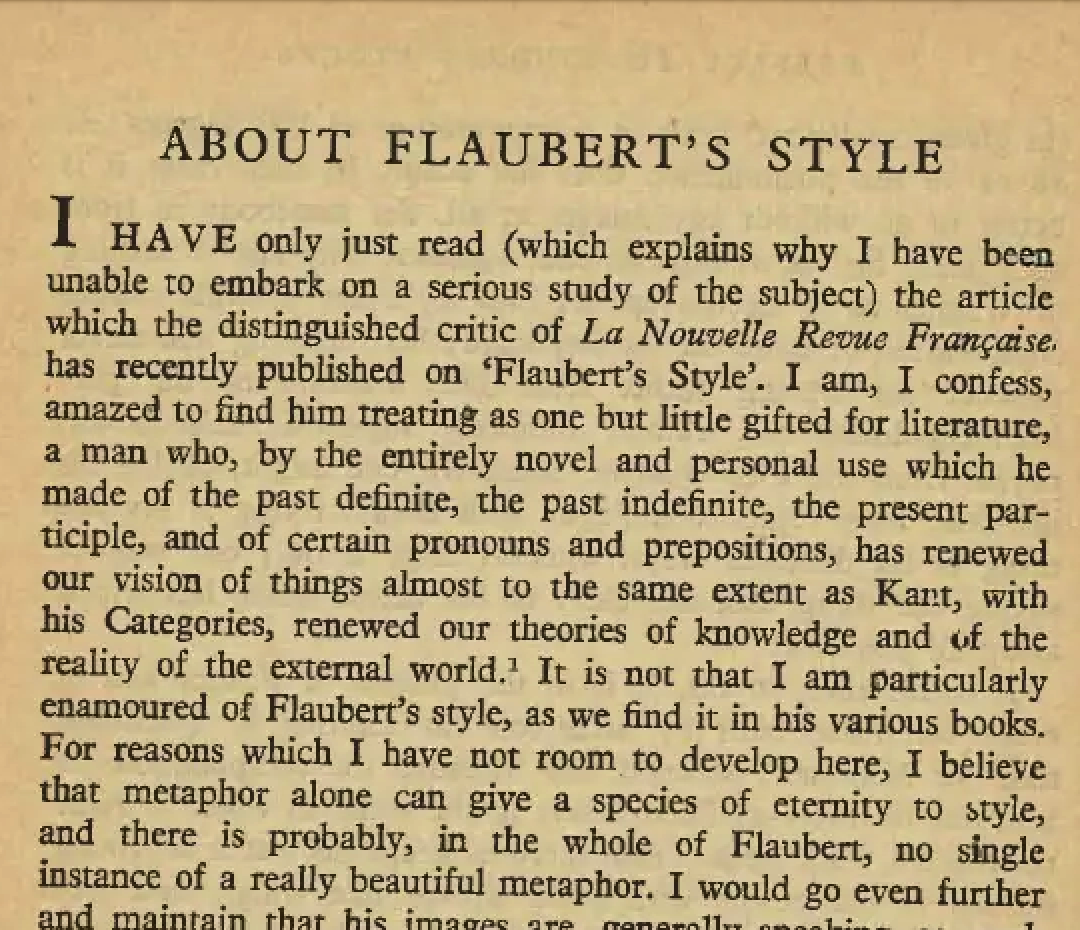
The example of Proust on Flaubert's silence, p. 234. One misremembered moment in A Sentimental Education sheds light on a huge achievement by Flaubert. (Proust forgets the chapter break and chapter title, and so accidentally improves on Flaubert by imagining more continuous narrative rather than the discontinuous narrative there in fact is, lol.) Proust is a great writer because he reads so closely and because he misreads so creatively.
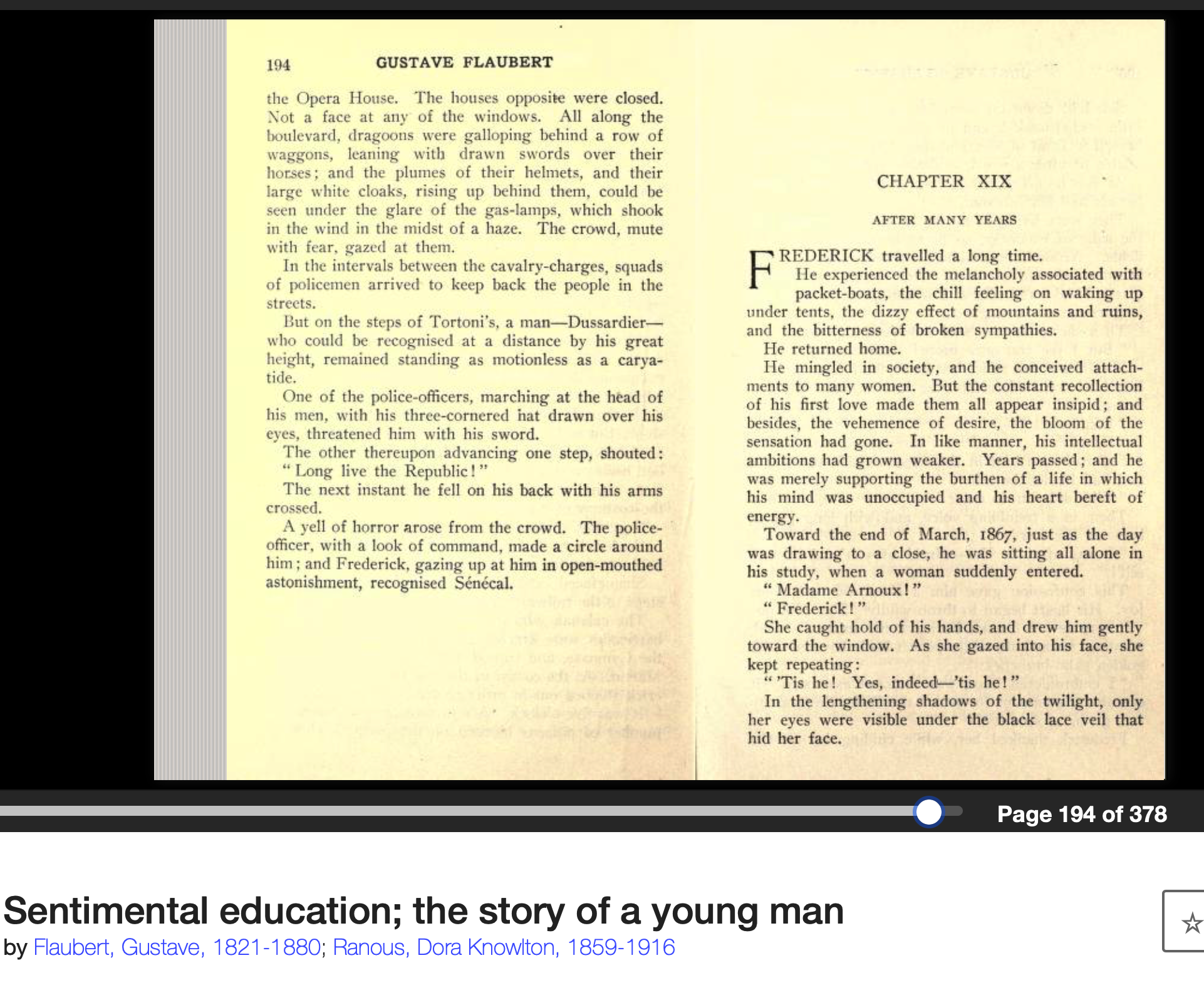
Go to an introduction to the book. Usually, you'll get a biography and some commentary on the book, like in Ian Patterson's introduction to Proust's Finding Time Again. Or you could skip the introduction and go to the first sentence of the book. Or . . . you could begin not with the book but with the writer's own thoughts about biography. Or by reading the writer's comments on what they read. So you can appreciate how the writer reads. Or . . . try reading the writer imitating other writers. Or read a great book someone wrote about reading the book you are going to read. Then go back to the book. Or you could keep going and never get back to the book. Or perhaps never finish it if your do go back.
Biographical Criticism
You Could Read the Writer Commenting on Biography (Don't cancel. It's dumb. Ad hominem denunication is not criticism)
"Sainte-Beuve championed a form of biographical criticism that saw texts as morally and intellectually inseparable from their writers. Here is Sainte-Beuve, as quoted by Proust:
So long as one has not asked an author a certain number of questions and received answers to them, though they were only whispered in confidence, one cannot be sure of having a complete grasp of him, even though these questions might seem at the furthest remove from the nature of his writings. What were his religious views? How did he react to the sight of nature? How did he conduct himself in regard to women, in regard to money? Was he rich, was he poor?[1]
Such queries led Sainte-Beuve to rank Bernard, Vinet, Molé, Verdelin, Meilhan, and Azyr among the great writers of his time, to dismiss Baudelaire and Balzac as vulgar and Hugo as overly political. History has not been on Sainte-Beuve’s side, and neither was Proust. À la recherche, the novel that grew out of this early piece of literary criticism, persuasively refutes Sainte-Beuve’s method by bringing into contrast the sometimes sordid lives of its characters and the emotional nuance of their experiences of the world. At the time Proust wrote Contre Sainte-Beuve, however, this refutation was still taking shape."
--Michael Shapiro, Contre Saint-Beuve
You Could Read How the Author Writes by [Mis]Reading Another Writer Who Wrote on How He Read [What] that Author [Didn't Write].
Nina Companeez tackles À la recherche du temps perdu
Or You Could Read a Great Book Someone Else Wrote about Reading the Even Greater Book You Are Going to Read.

Or You Could Read It for Wisdom:
"One should never bear grudges against people, never judge them by the memory of one unkind act, for we can never know all the good resolves and effective actions of which their souls may have been capable at another time. And so, even from the simple point of view of foresight, we make mistakes. For no doubt the bad pattern we observed on that one occasion will recur. But the soul is richer than that, has many other patterns which will also recur in the same man, yet we refuse to take pleasure in them because of one piece of bad behavior in the past."
The Prisoner, trans. Carol Cook, p. 311
Or you could wait to discover an introduction in the novel.
Here is what Proust writes about fictional introductions:
Novelists sometimes pretend in an introduction that while travelling
in a foreign country they have met somebody who has told them the
story of a person's life. They then withdraw in favour of this casual
acquaintance, and the story that he tells them is nothing more or less than
their novel. Thus the life of Fabrice del Dongo was related to Stendhal by
a Canon of Padua. [See also Abbé Prévost's Manon Lescaut; Denis Diderot's
The Nun; The Arabian Nights / 1,001 Nights] How gladly would we, when
we are in love, that is to say when another person's existence seems to us mysterious, find some such well-informed narrator! And undoubtedly he exists. Do we not
ourselves frequently relate, without any trace of passion, the story of
some woman or other, to one of our friends, or to a stranger, who has
known nothing of her love-affairs and listens to us with keen interest?
The person that I was when I spoke to Bloch of the Duchesse de Guermantes,
of Mme. Swann, that person still existed, who could have
spoken to me of Albertine, that person exists always… but we never
come across him. It seemed to me that, if I had been able to find women
who had known her, I should have learned everything of which I was
unaware. And yet to strangers it must have seemed that nobody could
have known so much of her life as myself. Did I even know her dearest
friend, Andrée? Thus it is that we suppose that the friend of a Minister
must know the truth about some political affair or cannot be implicated
in a scandal. Having tried and failed, the friend has found that whenever
he discussed politics with the Minister the latter confined himself to
generalisations and told him nothing more than what had already appeared
in the newspapers, or that if he was in any trouble, his repeated attempts
to secure the Minister's help have ended invariably in an: "It is not in my
power" against which the friend is himself powerless. I said to myself: "If
I could have known such and such witnesses!" from whom, if I had
known them, I should probably have been unable to extract anything
more than from Andrée, herself the custodian of a secret which she refused
to surrender. Differing in this respect also from Swann who, when
he was no longer jealous, ceased to feel any curiosity as to what Odette
might have done with Forcheville, even after my jealousy had subsided,
the thought of making the acquaintance of Albertine's laundress, of the
people in her neighbourhood, of reconstructing her life in it, her
intrigues, this alone had any charm for me.
--Proust, The Fugitive trans. C K Scott Moncrieff
Or perhaps you could read the way an author mimics another's style so well you're not sure who wrote it. Flaubert imitated many famous French writers in this book:

Marcel Proust, The Lemoine Affair. Here is the linked pdf; read for free online here with "look inside." (TRANSLATOR CHARLOTTE MANDELL)
Or perhaps you could watch the trailer to a film adaptation.
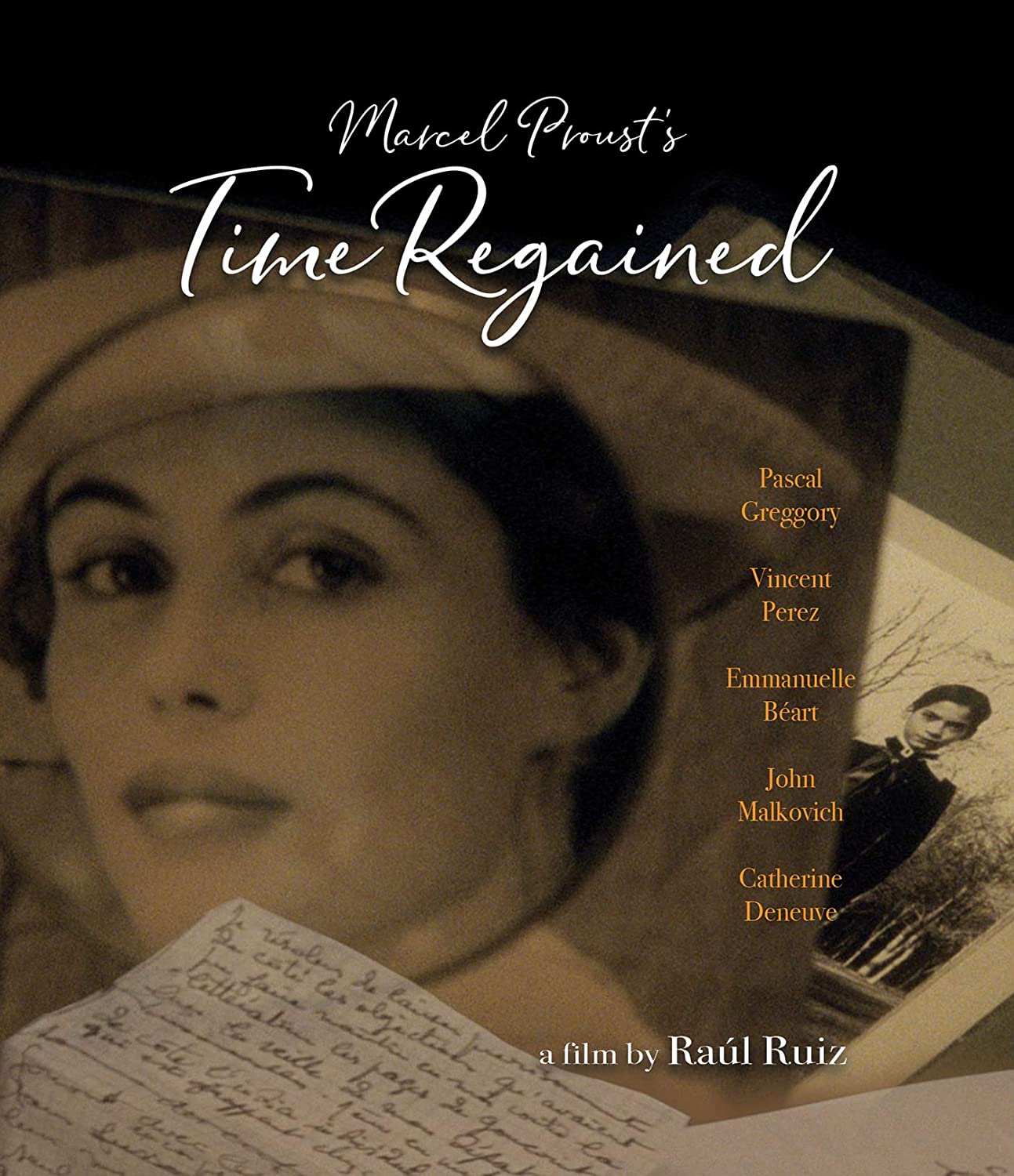
Time Regained (dir. Raul Ruiz, 1999)
Or you could watch a clip from a French TV (2011) adaptation.
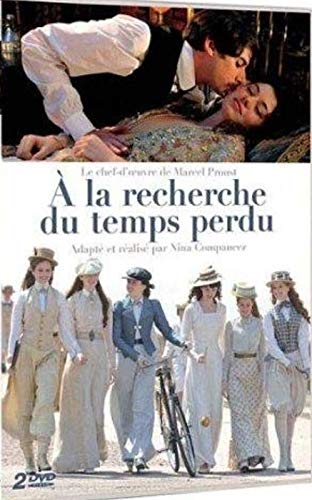
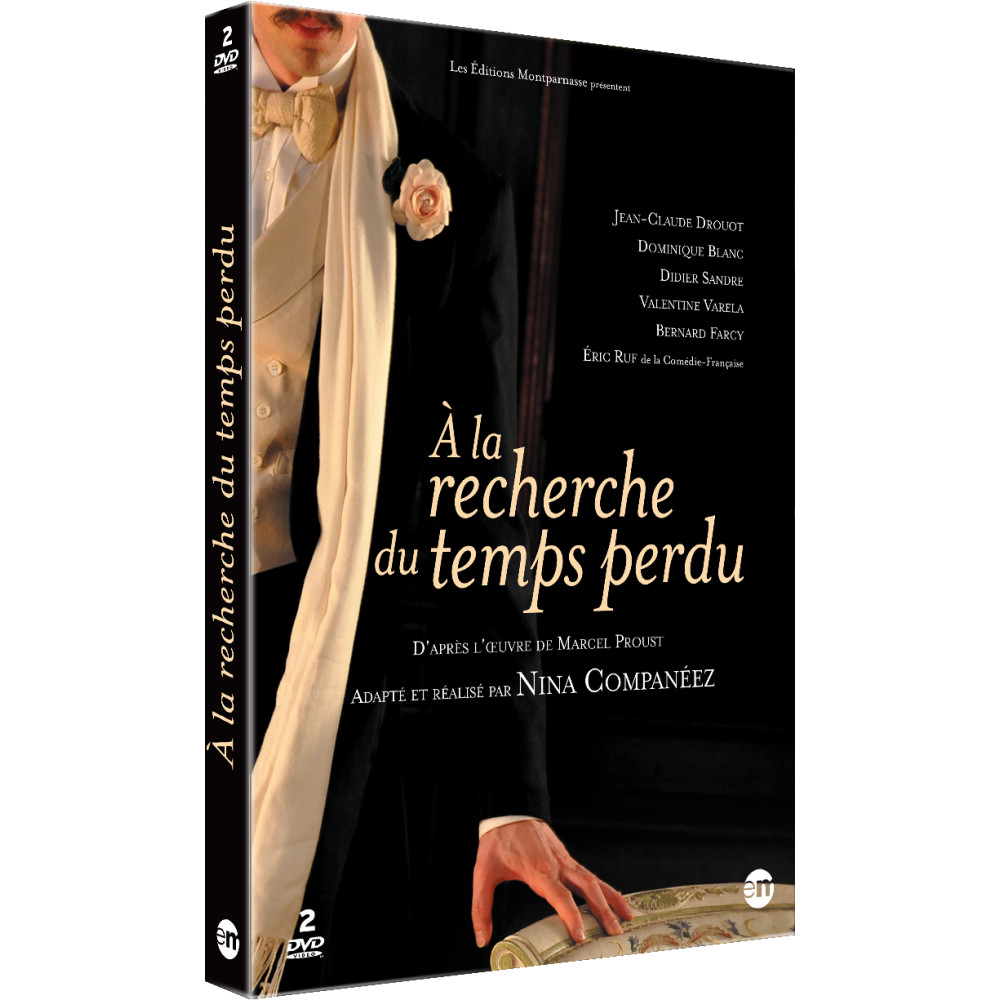
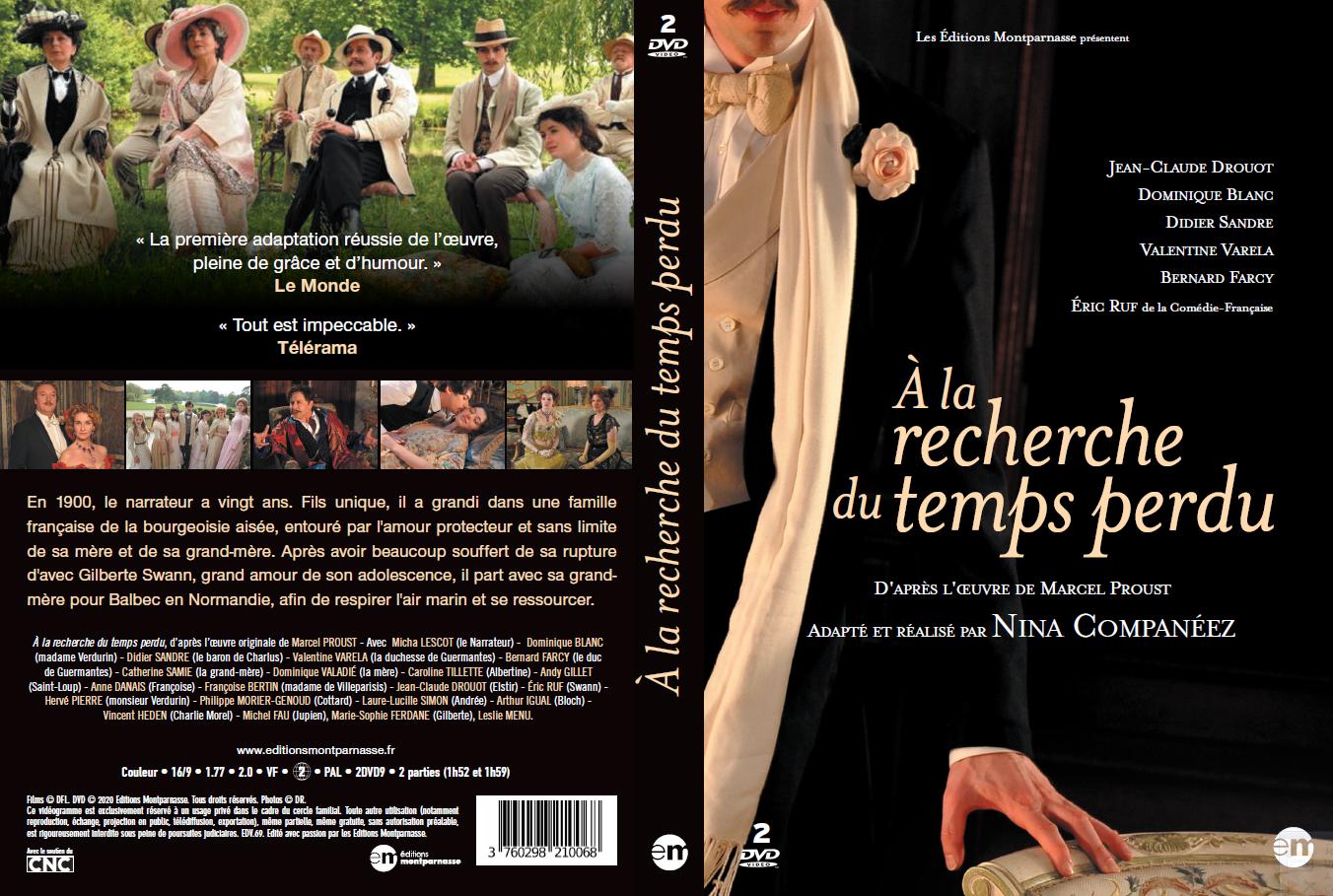
https://www.editionsmontparnasse.fr/p1937/A-LA-RECHERCHE-DU-TEMPS-PERDU-2-DVD-DVD
Time Regained (dir. Raul Ruiz, 1999) / Trailer (2018)

Trailer (2018)
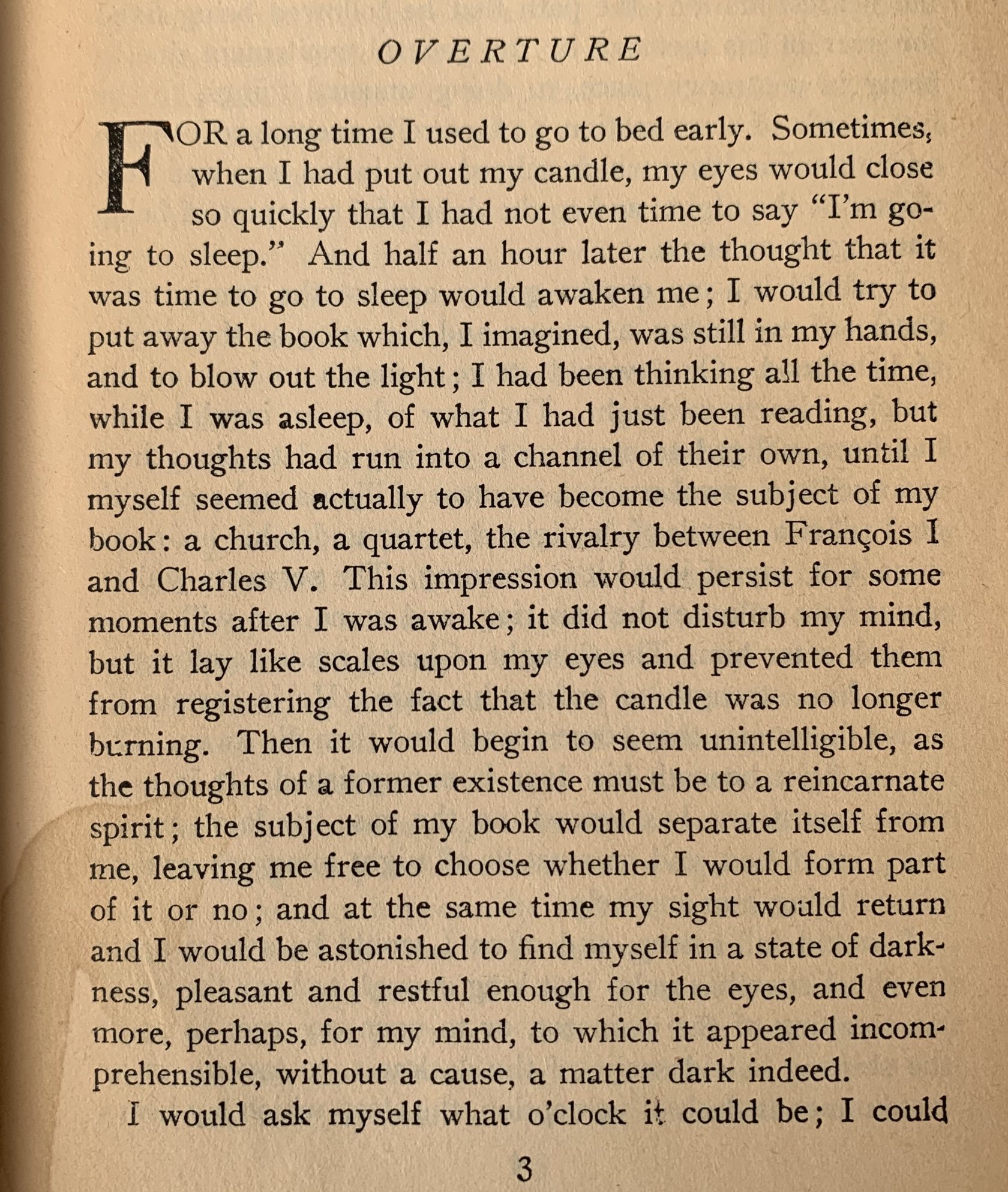
“Longtemps, je me suis couché de bonne heure."
“For a long time I used to go to bed early.” Scott Moncrieff-Terence Kilmartin
"For a long time, I went to bed early." Lydia Davis
"For a long time I would go to bed early."
“Time was when I always went to bed early." James Grieve; Richard Howard (translating Roland Barthes' "Longtemps, je me suis couché de bonne heure.")
“Time and again, I have gone to bed early.” Richard Howard
The recurrence of the word "time"
The first sentence of Swann's Way
The hilarious scene of Baron Charlus expressing his dissatisifaction with the gigolo who is whipping him in Time Found Again
Albertine's refusal of a kiss from the narrator at the end of In the Shadow of Young Girls
Albertine's invitation to the narrator to kiss her in The Guermantes Way.
Who is Gerard Genette?
What does "lost time" mean in the title In Search of Lost Time?
"Proust's work is a complete-incomplete work."
--Maurice Blanchot, "The Experience of Proust," in The Book to Come, p. 24.
Thus, not only is the Recherche, as Blanchot says, a "completed-incompleted" work, but its very reading is completed in completion, forever in suspense, forever "to be taken up again," since the object of that reading is constantly thrown into a dizzy rotation."
--Gérard Genette, "Proust Palimpsest," Figures of Literary Discourse, p. 222
"The Recherche, more than all other works, must not be considered closed. . . .
If the Recherche was complete once, it is not so anymore, and the way in which it
admitted the extraordinary later expansion perhaps proves that
that temporary completion was, like all completion, only a retro-
spective illusion. We must restore this work to its sense of un-
fulfillment, to the shiver of the indefinite, to the breath of the
imperfect. The Recherche is not a closed object: it is not an object.
Here again, no doubt Proust's (involuntary) practice goes be-
yond his theory and his plan — let us say at least that it corre-
sponds better to our desire."
-Gérard Genette, Narrative Discourse An Essay on Method Translated by Jane E. Lewin Foreword by Jonathan Culler (Cornell University Press), 21; 268. facsimile / html
In fact each moment of the Recherche appears in a sense twice over: first in the Recherche as the birth of a vocation and second in the Recherche as the exercise of this vocation: but these two are not given to the reader together, and it is the lot of the reader informed in extremis that the book he has just read remains to be written and that this book is more or less (but only more or less) the one he has just read --to go back to those distant pages, to the childhood at Combray, the evening at the Guermantes, the death of Albertine, which he had read as safely deposited, gloriously embalmed in a finished work, and which he must now read again, identical in fact but a little different, as if in abeyance, still unburied, anxiously stretching forward an as yet unfinished work, and conversely, forever. Thus, not only is the Recherche du temps perdu, as Blanchot says, a 'completed-uncompleted' work, but its very reading is competed in incompletion, forever in suspense, forever 'to be taken up again' since the object of that reading is constantly thrown into a dizzying rotation."
Thus, not only is the Recherche, as Blanchot says, a "completed-incompleted" work, but its very reading is completed in completion, forever in suspense, forever "to be taken up again," since the object of that reading is constantly thrown into a dizzy rotation."
--Gérard Genette, "Proust Palimpsest," Figures of Literary Discourse, pp. 203-28; to p. 222
"But for me it was enough if, in my own bed, my sleep was so heavy as completely to relax my consciousness; for then I lost all sense of the place in which I had gone to sleep, and when I awoke at midnight, not knowing where I was, I could not be sure at first who I was; I had only the most rudimentary sense of existence, such as may lurk and flicker in the depths of an animal’s consciousness; I was more destitute of human qualities than the cave-dweller . . . . "
--Marcel Proust, Swann's Way
Third Question:
Readers may already have observed that neither the title nor the subtitle of this book mentions what I have just designated as its specific subject. The reason is neither coyness nor deliberate inflation of the subject. The fact is that quite often, and in a way that may exasperate some readers, Proustian narrative will seem neglected in favor of more general considerations; or, as they say nowadays, criticism will seem pushed aside by "literary theory," and more precisely by the theory of narrative or narratology. I could justify and clarify this ambiguous situation in two very different ways. I could either—as others have done elsewhere—frankly put the specific subject at the service of the general aim, and critical analysis at the service of theory: in that case the Recherche would be only a pretext, a reservoir of examples, and a flow of illustration for a narrative poetics in which the specific features of the Recherche would vanish into the transcendence of "laws of the genre." Or, on the other hand, I could subordinate poetics to criticism and turn the concepts, classifications, and procedures proposed here into so many ad hoc instruments exclusively intended to allow a more precise description of Proustian narrative in its particularity, the "theoretical" detour being imposed each time by the requirements of methodological clarification.
I confess my reluctance—or my inability—to choose between these two apparently incompatible systems of defense. It seems to me impossible to treat the Recherche du temps perdu as a mere example of what is supposedly narrative in general, or novelistic narrative, Or narrative in autobiographical form, or narrative of God knows what other class, species, or variety. The specificity of Proustian narrative taken as a whole is irreducible, and any extrapolation would be a mistake in method; the Recherche illustrates only itself. But, on the other hand, that specificity is not undecomposable, and each of its analyzabie features lends itself to some connection, comparison, or putting into perspective. Like every work, like every organism, the Recherche is made up of elements that are universal, or at least transindividual, which it assembles into a specific synthesis, into a particular totality. To analyze it is to go not from the general to the particular, but indeed from the particular to the general: from that incompa- rable being that is the Recherche to those extremely ordinary elements, figures, and techniques of general use and common cur- rency that I call anachronies, the iterative, localizations, paralipses, and so on. What I propose here is essentially a method of analysis; I must therefore recognize that by seeking
the specific I find the universal, and that by wishing to put theory at the service of criticism I put criticism, against my will, at the service of theory. This is the paradox of every poetics, and doubtless of every other activity of knowledge as well: always torn between those two unavoidable commonplaces—that there are no objects except particular ones and no science except of the general—but always finding comfort and something like attrac- tion in this other, slightly less widespread truth, that the general is at the heart of the particular, and therefore (contrary to the common preconception) the knowable is at the heart of the mysterious.
--Gérard Genette, "Preface," Figures of Literary Discourse,
Gérard Genette, Narrative Discourse An Essay on Method Translated by Jane E. Lewin Foreword by Jonathan Culler (CORNELL UNIVERSITY PRESS) facsimile / html
Genette, Narrative Discourse on the seven beginnings of Swann's Way
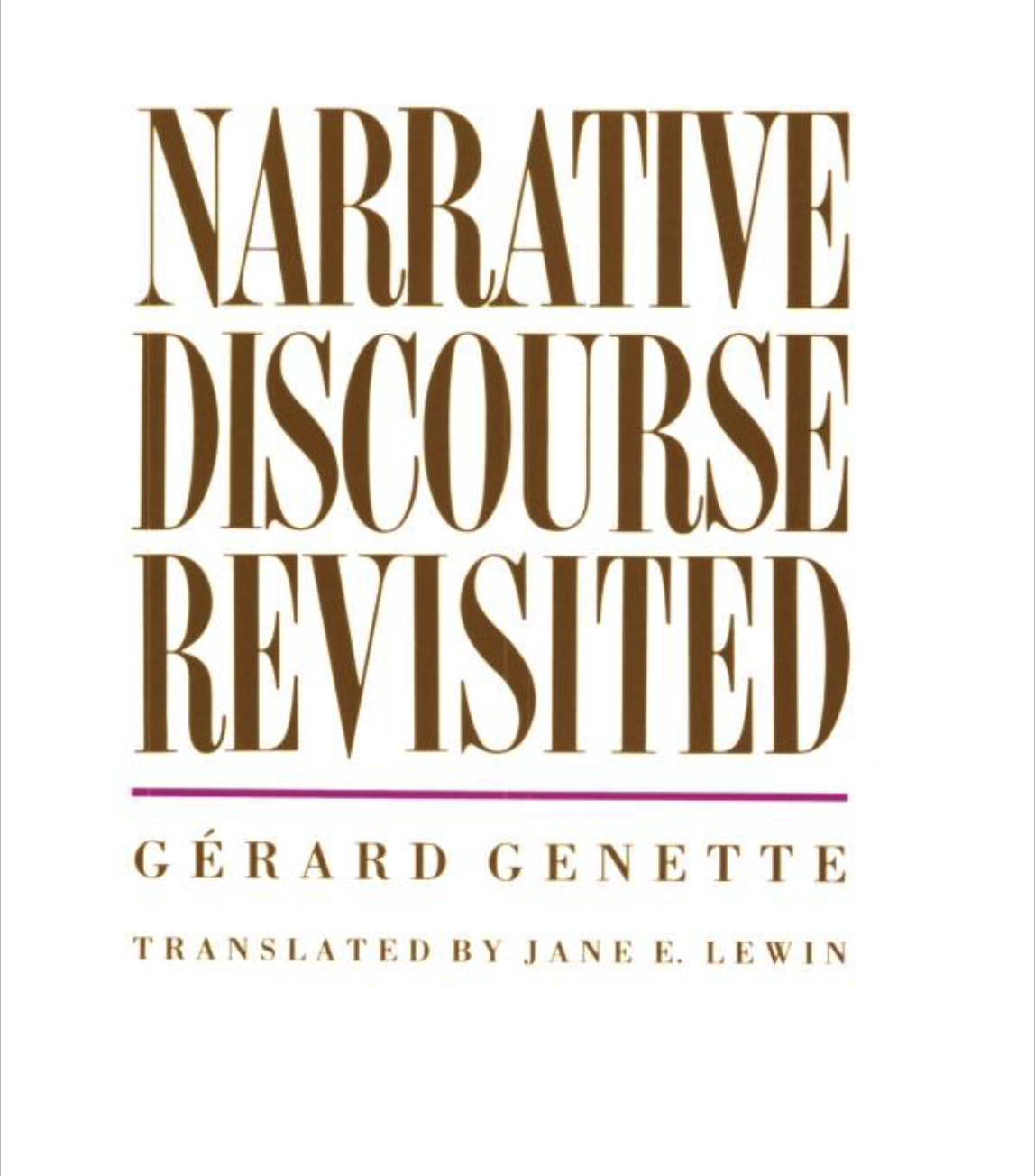
https://15orient.com/files/genette-on-narrative-discourse.pdf
All that is left is for the narrator to treat that element of the Sabbath ritual like the others, that is, in the iterative mode, in order to "iteratize," as it were, the deviant event in its turn, in accord with this irresistible process: singular event—repetitive narrating—iterative narrative (of that narrating)
p. 127
An example of the second is the episode of the steeples of Martinville, plainly presented as a deviation from habit: ordinarily, once he was back from his outing, Marcel for-got the impressions he had experienced and did not try to cipher their significance; "Once, however," he goes further and writes down immediately the descriptive piece that is
first work and the sign of his vocation.
pp. 139-40
And if in some cases—where we are dealing, for instance, with the inaccurate language of our own vanity—the rectification of an oblique interior discourse which deviates gradually more and more widely from the first and central impression, so that it is brought back into line and made to merge with the authentic words which the impression ought to have generated, is a laborious undertaking which our idleness would prefer to shirk, there are other circumstances—for example, where love is involved—in which this same process is actually painful. Here all our feigned indifferences, all our indignation at the lies of whomever it is we love (lies which are so natural and so like those that we perpetrate ourselves), in a word ail that we have not ceased, whenever we are unhappy or betrayed, not only to say to the loved one but, while we are waiting for a meeting with her, to repeat endlessly to ourselves, sometimes aloud in the silence of our room, which we disturb with remarks like: "No, really, this sort of behavior is intolerable," and: "I have consented to see you once more, for the last time, and I don't deny that it hurts me," all this can only be brought back into conformity with the felt truth from which it has so widely diverged by the abolition of all that we have set most store by, all that in our solitude, in our feverish projects of letters and schemes, has been the substance of our passionate dialogue with ourselves.
--Proust quoted By Genette, pp. 178-89
Unité ultérieure, non factice, sinon elle fût tombée en poussière comme tant de systématisations d'écrivains médiocres qui à grand renfort de titres et de sous-titres se donnent l'apparence; d'avoir poursuivi un seul et transcendant dessein.
-The Prisoner
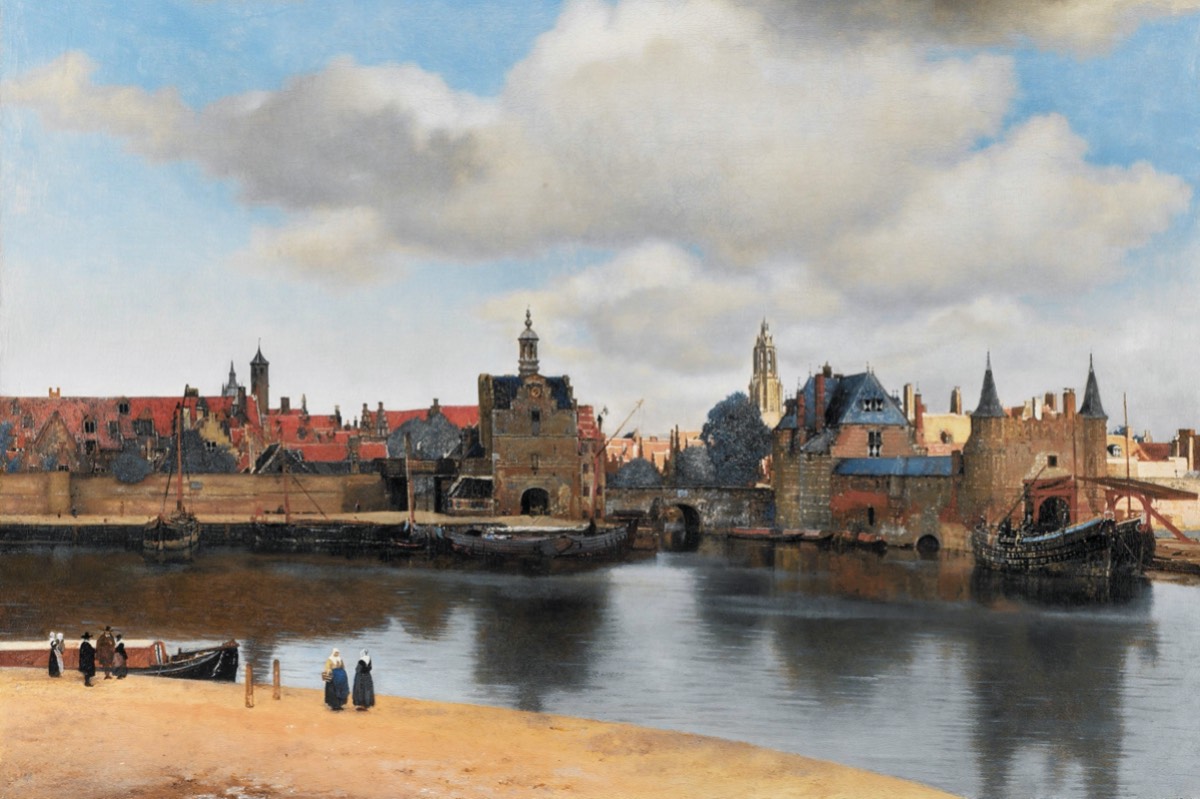
Ebooks for the Modern Library and Penguin editions may be found here. They may be available for less at other online vendors.
Marcel Proust | A la recherche du temps perdu | Texte intégral
The Five Longest Proust Sentences
Cleanth Brooks, "The Heresy of Paraphrase," in The Well Wrought Urn (1947)
How do we understand another mind? (Time Regained) What is Proustian? (involuntary memory; madeleine dipped it tea; Chris Marker, Rememory) What is Proustian about Proust?
Galley Sheets for Swann's Way
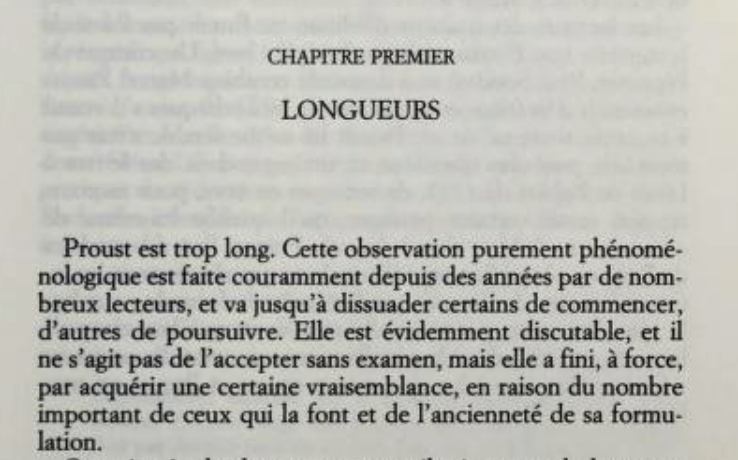
"Proust is too long."
--Pierre Bayard, Le hors-sujet : Proust et la digression (1996)
Georges Poulet, Proustian Space (1977)
Gerald Prince, "On Narratology"
"In the end, one is prompted to ask who this translation is for. It's a question addressed neither by Prendergast in his general introduction nor by the individual translators in the brief prefatory essays they have provided to each volume (excellent though some of them are, notably those to The Guermantes Way and The Prisoner, as thumbnail critical sketches of the novels). Certainly, the Penguin Proust, as compared with Moncrieff/Kilmartin/ Enright, establishes a new benchmark of fidelity; but, since it does so at the price of much oddly un-English prose, what sort of reader will stay the whole course? Perhaps one adept in French but not quite up to the task of scaling Proust unaided, who might keep the Penguin open alongside his French text to help him over craggy sections of the original. Yet readers willing to toil through the 3,300 pages of the novel in this sort of do-it-yourself parallel text will surely be few and far between. For those without French considering setting out on the Proustian journey, the Moncrieff/ Kilmartin/Enright translation, remains, in my view, the best available reading text. "
--Paul Davis, "Reviving the Dread Deity," Swann's Way: A Search for Lost Time. Translation James Grieve 1982. Proust and Genette can both be melancholic and humorous, sometimes at the same time. How can we understand other minds? Problems include not listening or paying attention; not looking but radiographing other people (Finding Time Again, pp. 24-25)
"One should never bear grudges against people, never judge them by the memory of one unkind act, for we can never know all the good resolves and effective actions of which their souls may have been capable at another time. And so, even from the simple point of view of foresight, we make mistakes. For no doubt the bad pattern we observed on that one occasion will recur. But the soul is richer than that, has many other patterns which will also recur in the same man, yet we refuse to take pleasure in them because of one piece of bad behavior in the past."The Prisoner, p. 311 We will return to this passage later in the semester and reread it in relation to what follows a few sentences later.
Is Proust's Recherche, a novel? Or a philosophical essay? Proust himself could not decide which.
A favorite talking point of establishment, so-called progressives who support de-platforming and social media censorship by Silicon Valley tech giants is "free speech doesn't mean speech free from consequences." That is a typically vague, but also threatening neoliberal content free statement. What consequences follow from exercising your First Amendment right to free speech other than more speech? Doxxing? Getting fired from your job? If you are against free speech, that is your right. But the consequence is that I will think you are really dumb. And ignorant. And morally under-developed. And figure that you are probably white. Ditto if you are against due process. The First Amendment protects minorities and those with minority opinions from being de-platformed and censored. "Hate speech," otherwise known as "speech I don't like," is constitutionally protected speech. Guess what happens to Palestinian student activists if they organize a boycott of Israel. The Fifth Amendment guarantees due process, meaning someone is presumed innocent until proven guilty. Guess how many black men have been falsely accused and convicted of raping a white woman only to be exonerated decades later because DNA evidence proved their innocence. Have you ever seen To Kill a Mockingbird? Guess how many people convicted of murder and then executed were posthumously exonerated. Guess how many black people have been lynched. Google it. Educate yourself. Know your civil liberties. Don't be dumb, be a smartie. Universal Rights protect racial and sexual minorities. "Representation," perhaps the most cynical notion of politics ever to emerge from the elites in the history of the United States, does not. The National Security State wants your identitification papers. Authoritarianism, censorship, Big Tech demonitization and deplatforming of social media, policing who can say what where, the pre-school politics of twitter are antithetical to the thought and imaginative freedom which creating literature involves.
"Proust's work is a complete-incomplete work."--Maurice Blanchot, "The Experience of Proust " in "The Experience of Proust," in The Book to Come, pp. 11-24; to p. 24.
If you are here at UF to get an education, you will probably do well in this course. If you want to learn, I can help you learn. If you took this course because it fills a slot in your schedule, you probably will not do well. You may even fail. If you have "senioritis," you might want to take another course. Sadly, I have occasionally had to fail graduating seniors who didn't attend the course or do the work. It's not over til it's over.
Roland Barthes and Gille Deleuze roundtable on Proust in "Two Regimes of Madness" Semiotext(e)
"But I was incapable of seeing a thing unless a desire to do so had been aroused in me by reading; unless it was
a thing of which I wanted a previous sketch to confront later with reality."--Proust, Finding Time Again
Full text of In Search Of Lost Time ( Complete Volumes) dipliomatic transcription in html
In Search Of Lost Time (Complete Volumes) digital facsimile
Who's Who in Proust? Ordre d’entrée en scène des personnages
Deepl Translator
Proust, ses personnages (the editions and English translations)
Proust First Day of Class / Resources / Translations
Merriam-Webster / Oxford English Dictionary (you'll need to log-in through UF.)
How To Pronounce Marcel Proust
Marcel Proust and Swann's Way: 100th Anniversary (2013)


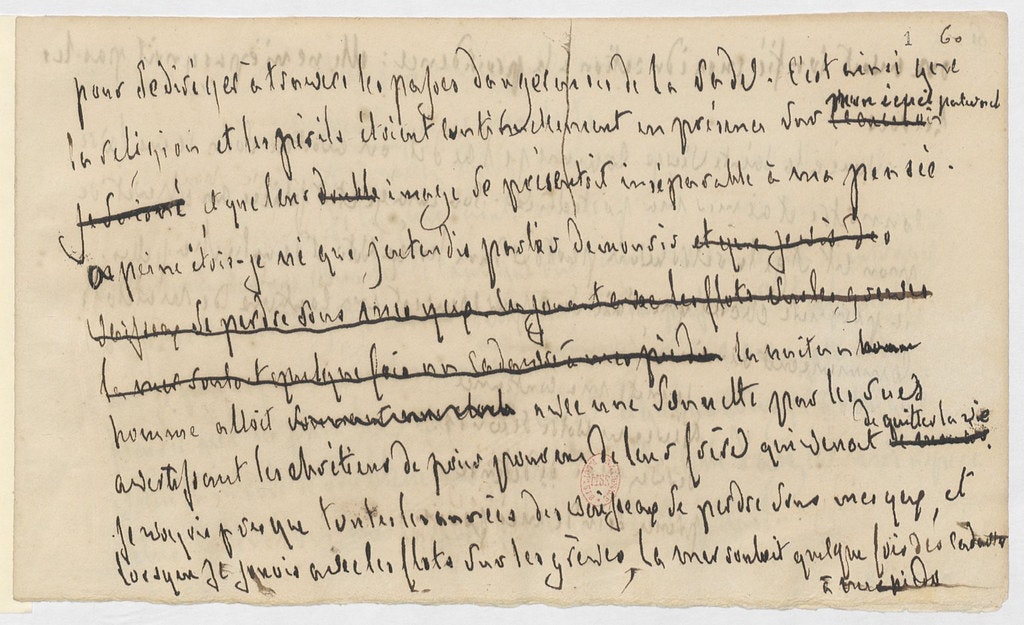

Vera A. Klekovkina, "Proust's souvenir visuel and Ruiz's clin d'œil in Le Temps retrouvé," L'Esprit Créateur Vol. 46, No. 4, Proust en devenir (Winter 2006), pp. 151-163
David Ellison, A Reader's Guide to Proust's 'In Search of Lost Time' 2010
'How full of meaning and significance the language of music is we see from the repetition signs, as well as from the Da capo which would be intolerable in the case of works composed in the language of words. In music, however, they are very appropriate and beneficial; for to comprehend it fully, we must hear it twice.'
Arthur Schopenhauer, "On the Metaphysics of Music"
The First Confidential Report of Swann's Way

Honoré de Balzac's novella The Girl with the Golden Eyes comes up in Time Regained.
What is Balzacian about Balzac? How does he tell the story? "This is the story of . . . " What saves the novella from being merely the product of an angry, misanthropic, dyspeptic old man?
Title: The Girl with the Golden Eyes Honore de Balzac Translator: Ellen Marriage (digital auto-dramatization vs. dramatic reading by a real person)
Alfred de Musset
London Grammar - Rooting For You
Still Corners - Black Lagoon
Chris Isaak - Wicked Game
Lana Del Rey - Summertime Sadness
CHROMATICS "SHADOW"
“Many people will disagree with what I have to say now, but I shall confine myself to those who have been, shall I say, unhappy enough to love passionately for many years, unrequitedly and against hopeless odds.”
----Gérard Genette, "Proust Palimpsest," Figures of Literary Discourse, p. 164
"Proust's work is a complete-incomplete work."
--Maurice Blanchot, "The Experience of Proust," in The Book to Come, p. 24.
Thus, not only is the Recherche, as Blanchot says, a "completed-incompleted" work, but its very reading is completed in completion, forever in suspense, forever "to be taken up again," since the object of that reading is constantly thrown into a dizzy rotation."
--Gérard Genette, "Proust Palimpsest," Figures of Literary Discourse, p. 222
Complete? or Completed? Blanchot's sentence in French is below.


IPA/French / English pronunciation of French / Deepl French to English Translator / Cambridge French to English translator (don't rely on just one. Sometimes a nonsensical English word appears; that's because it's a bad translation. Try "préséance," for example. "Preset"? Or "precedence?")
“Many people will disagree with what I have to say now, but I shall confine myself to those who have been, shall I say, unhappy enough to love passionately for many years, unrequitedly and against hopeless odds.”
----Gérard Genette, "Proust Palimpsest," Figures of Literary Discourse, p. 164
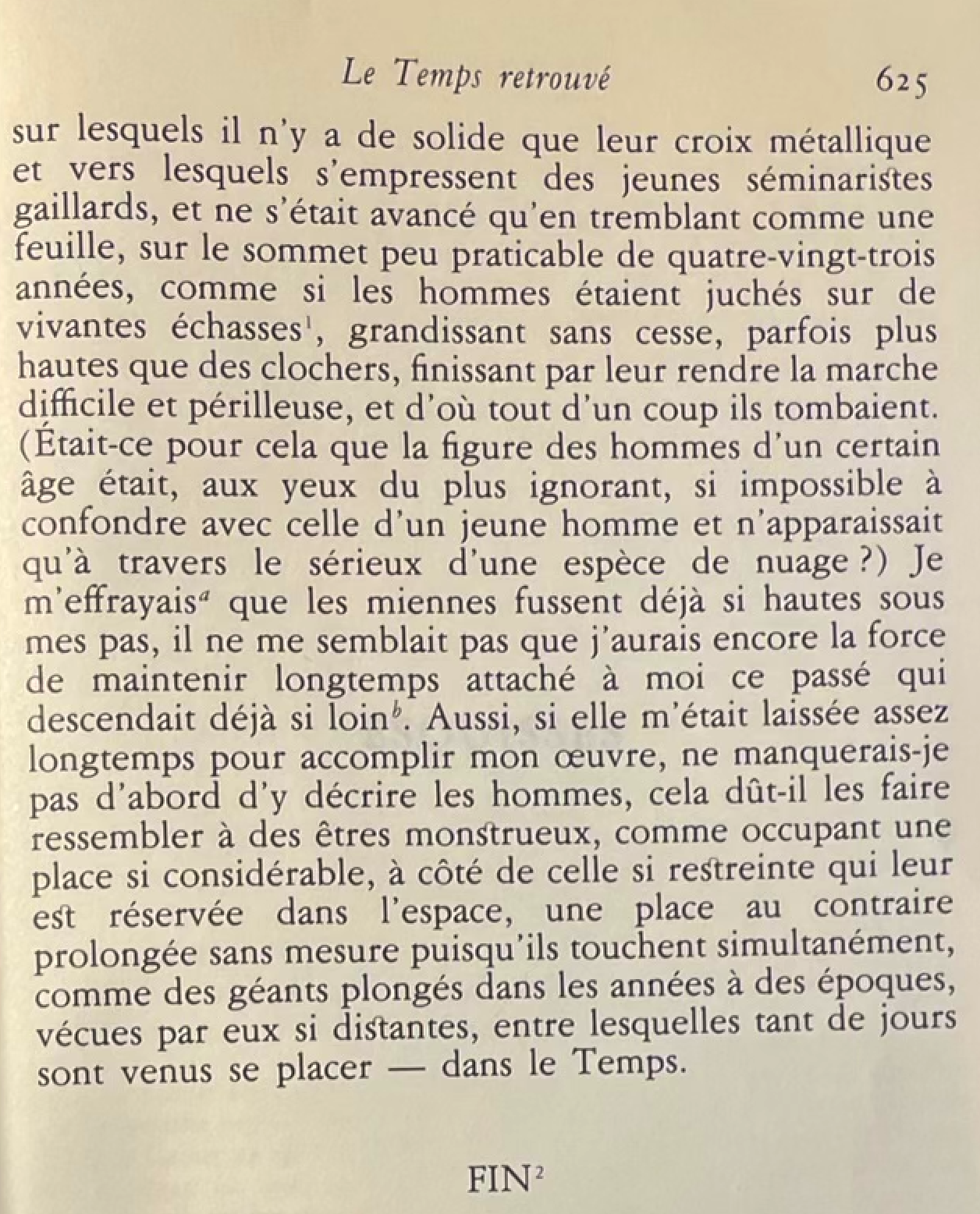
Le Temps retrouvé, 1954 Pléiade edition
The word "longtemps," near the beginning of the last sentence, recalls the first word of the novel. English translations lose this repetition, a word that occurs many times across the Recherche, including the second to last sentence. Translators are forced to adopt variations of "long enough" or "time enough" since the adjective that modifies "longtemps," "assez" means "enough."
I was terrified that my own were already so high beneath me and I did not think I was strong enough to retain for long a past that went back so far and that I bore within me so painfully. If at least, time enough were alloted to me to ac-complish my work, I would not fail to mark it with the seal of Time, the idea of which imposed itself upon me with so much force to-day, and I would therein describe men, if need be, as monsters occupying a place in Time infinitely more important than the restricted one reserved for them in space, a place, on the, contrary, prolonged immeasurably since, simultaneously touching widely separated years and the distant periods they have lived through—between which so many days have ranged themselves—they stand like giants immersed in Time.
--Time Regained
Journalism; Reading the Goncourt brothers journal
"And, when snuffing out the candle before I read the passage I transcribe below. . . So I closed the Goncourts' journal." Finding Time Again, pp. 15-23
"Here are the pages that I read before fatigue closed my eyes . . . There I stopped," Time Regained, pp. 27-38
The aged but still randy Baron and Jupien at the matinée at the House of the Princesse de Guermantes.
How to Pronounce Charlus - PronounceNames.com
How to Pronounce Marcel Proust? (CORRECTLY)

Time Regained (dir. Raul Ruiz, 1999)
Trailer (2018)
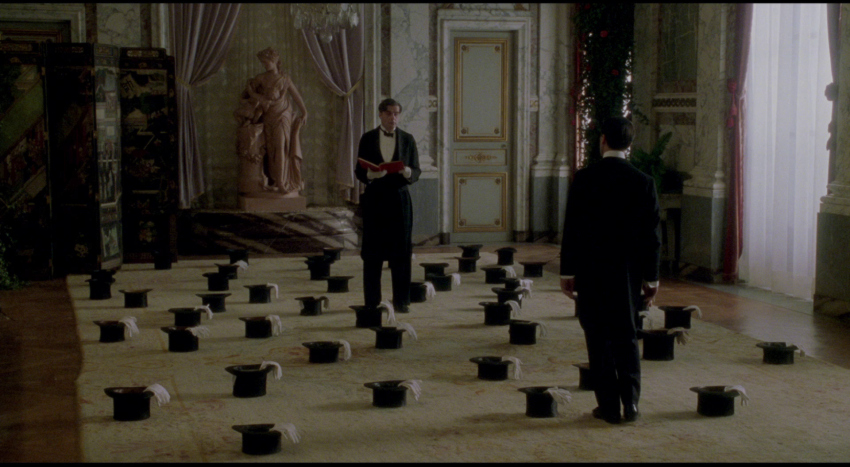
-
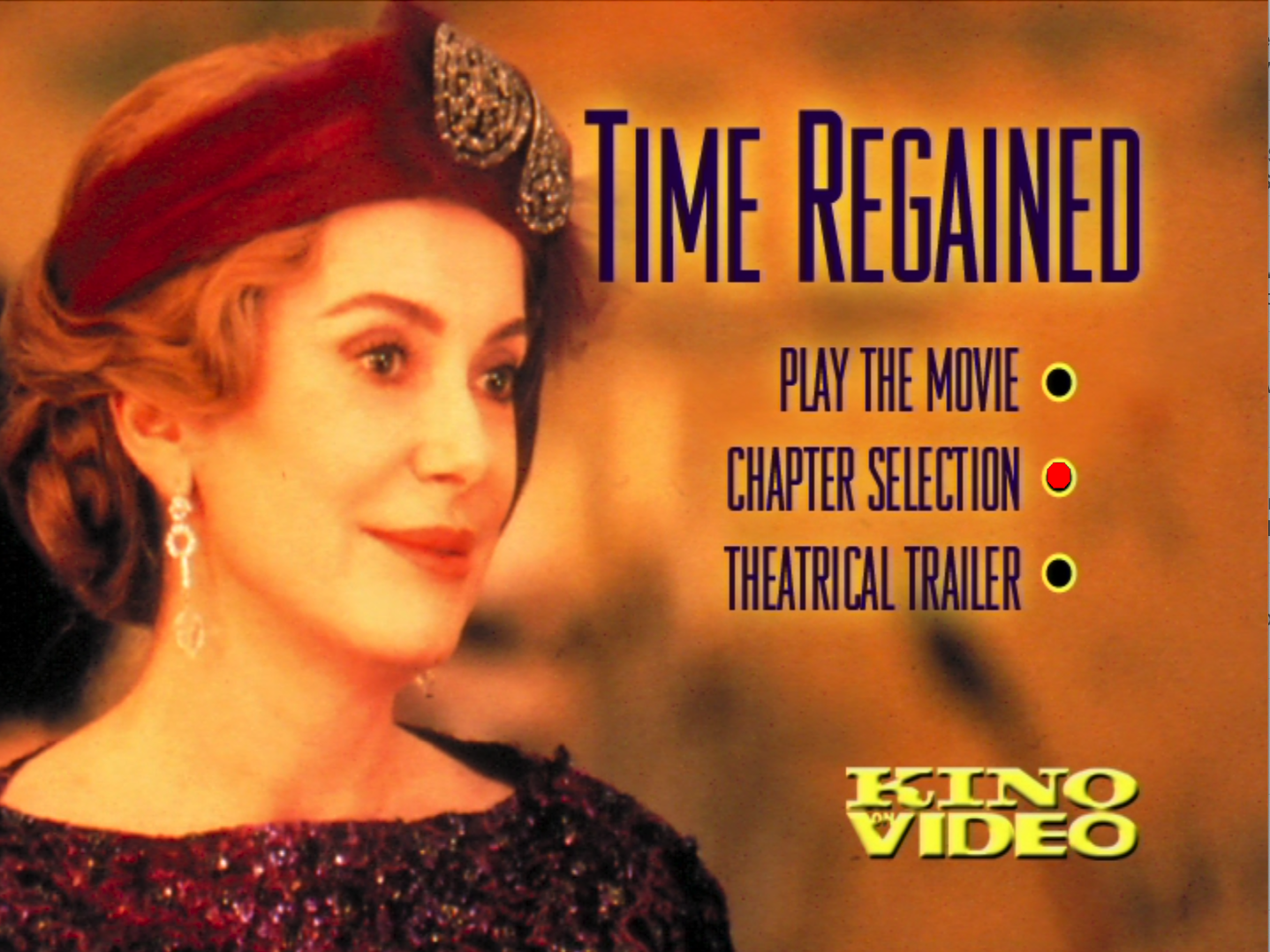
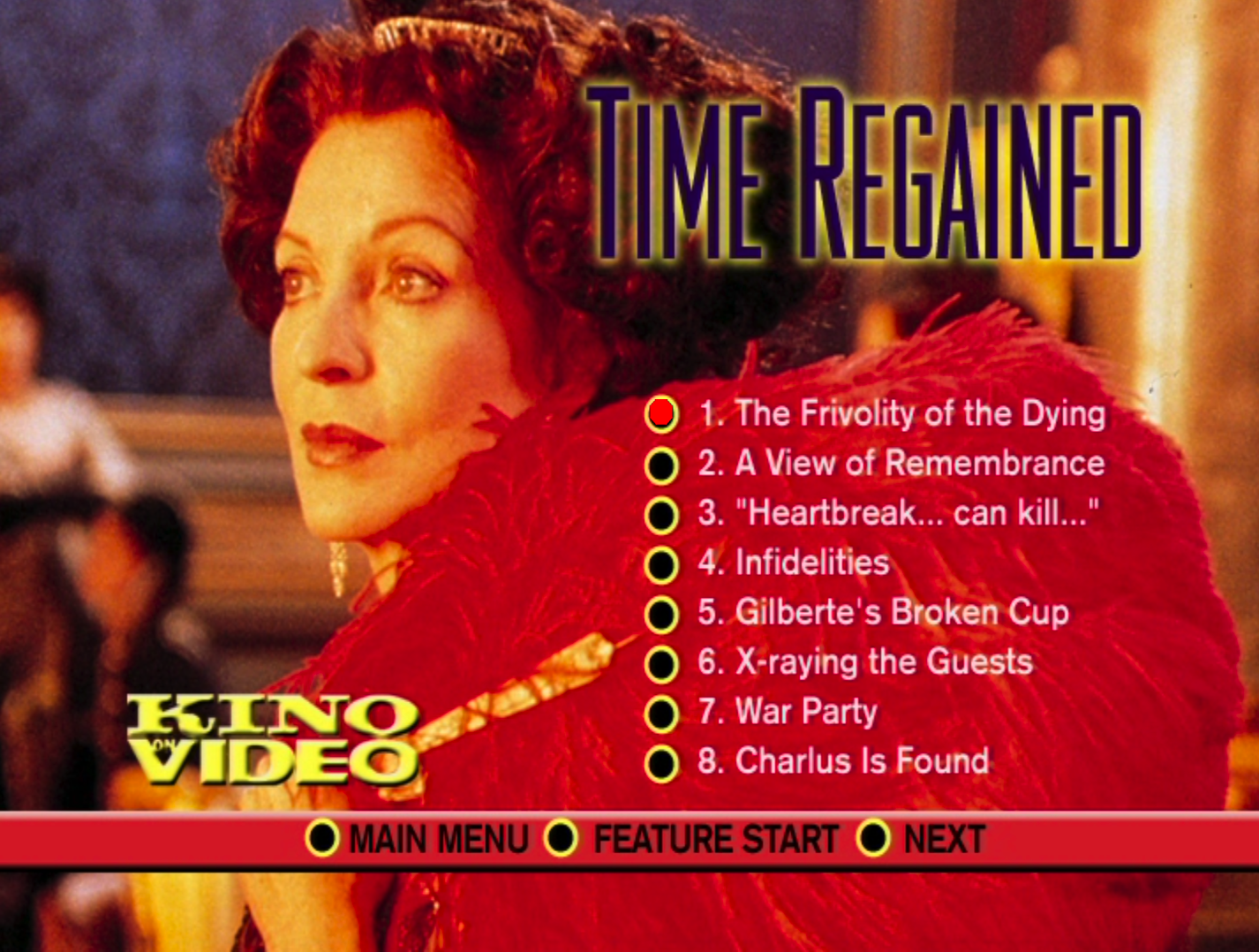
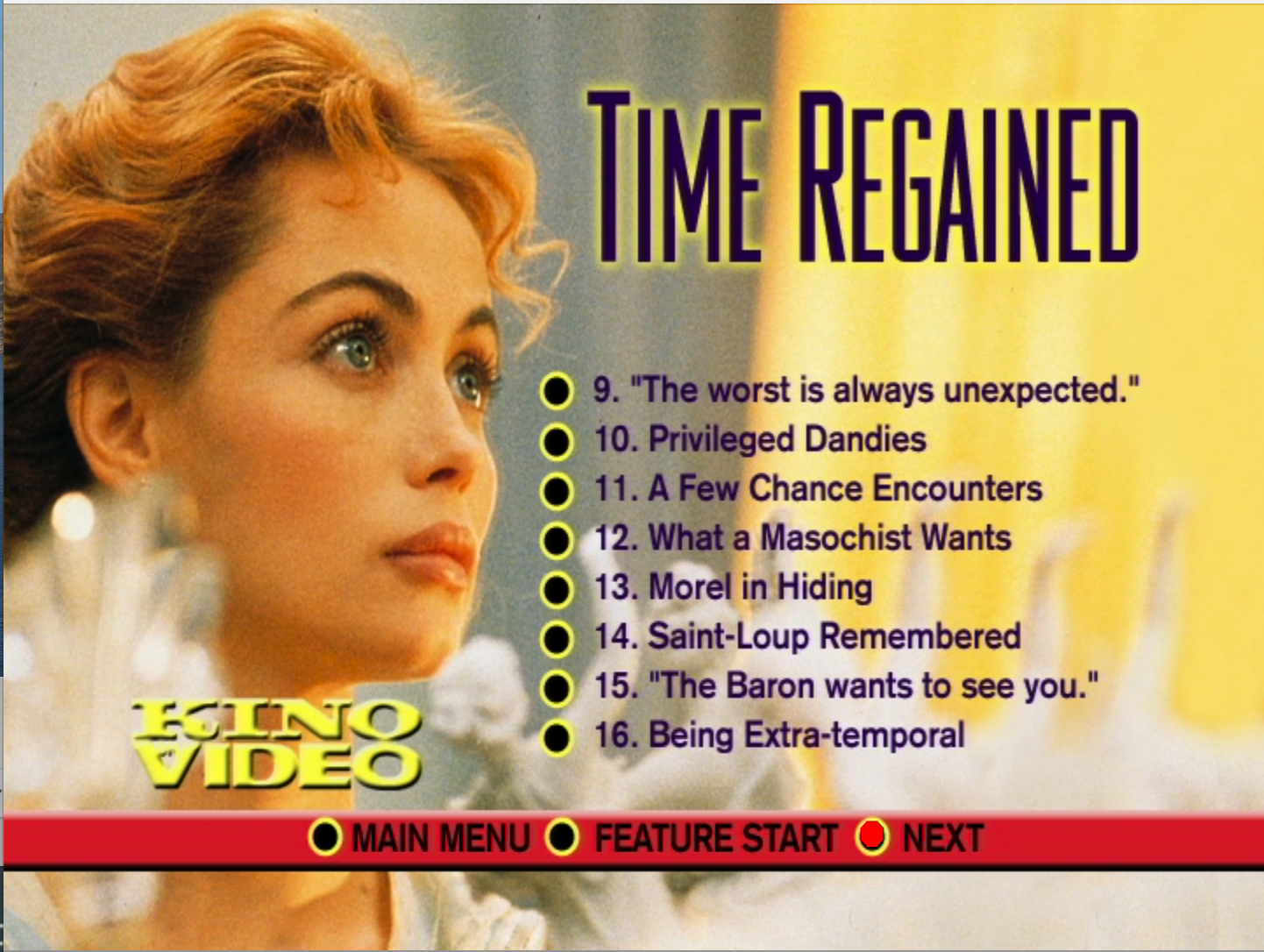
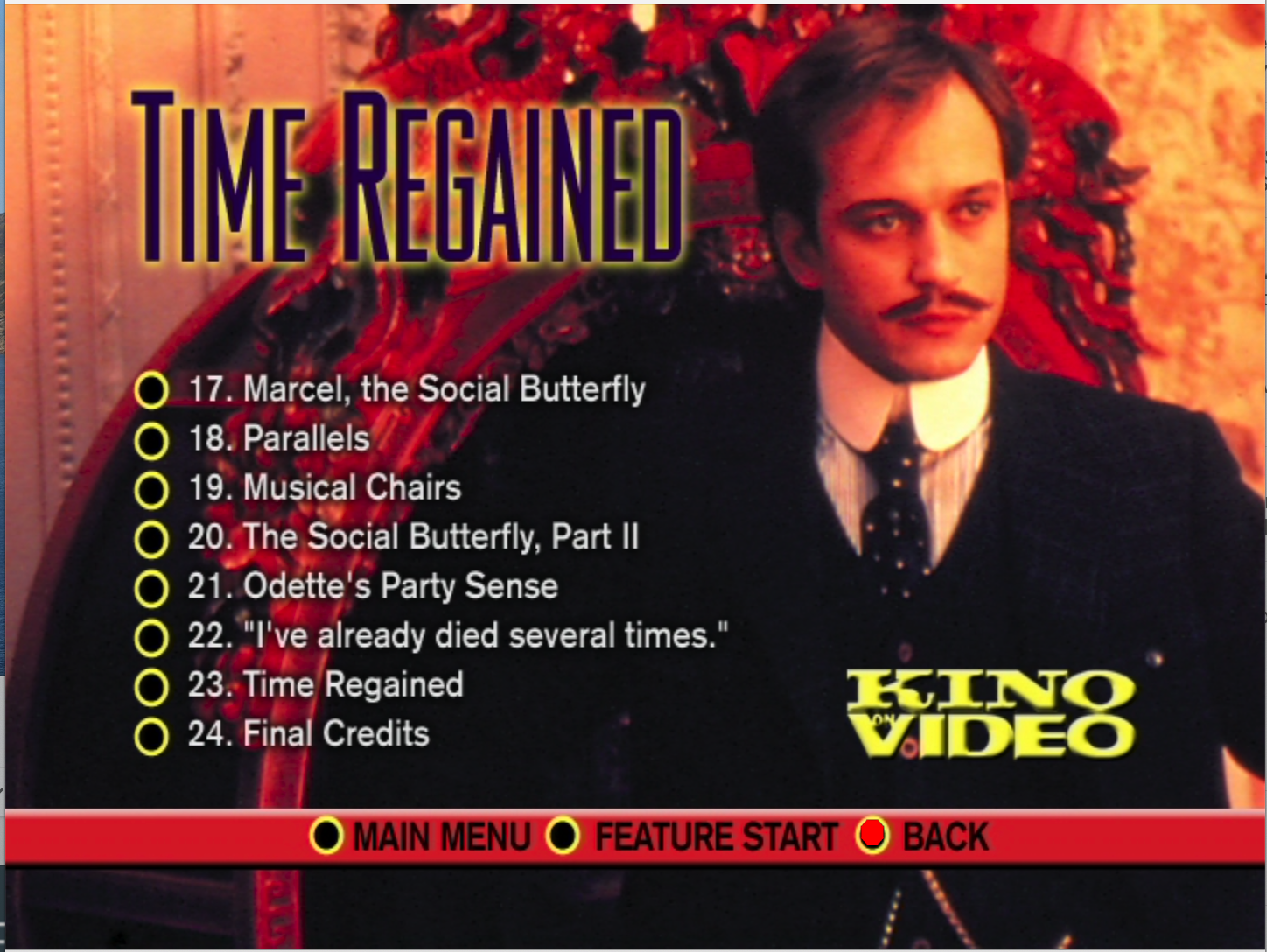
Three involuntary memories the narrator has in Time Regained:
1. The narrator's involuntary memory of stumbling over a cobblestone (taking him to Venice, in the film)




2. The narrator's involuntary memory of the sound of a train wheel being tapped by a train engineer when the narrator hears the sound of a spoon stirring a cup of tea in the Guermantes library.




3. The narrator's involuntary memory of a stiff napkin he used in a hotel at Balbec when he uses a similar napkin to wipe his mouth after drinking the cup of tea:


"Lost Time" is not the past.



"Lost Time" (p. 185) in the title does not mean the past. It means "extratemporal," or eternity, a fleeting, joyous, something one can experience outside of time (chronological or clock time) through involuntary memory (combining a moment from the past to an analogous moment in the present) and reading books, an experience that "resurrects" and puts death out of mind is a way to find it. See the library scene in Finding Time Again (Viking / Penguin, Trans. Ian Patterson, pp. 173-88) In the Montrieff translation linked below, the passage begins with "I got out of the carriage again" and ends with "sweetness of a mystery which is but the twilight through which we have passed. " "Of a truth, the being within me which sensed this impression, sensed what it had in common in former days and now, sensed its extra-temporal character, a being which only appeared when through the medium of the identity of present and past, it found itself in the only setting in which it could exist and enjoy the essence of things, that is, outside Time."
Lost time is not only extra-temporal, outside of linear time, for Proust, but omni-temporal.
Marcel Proust, SWANN'S WAY Remembrance Of Things Past, Volume One
Translated From The French By C. K. Scott Moncrieff NEW YORK
HENRY HOLT AND COMPANY 1922
Vera A. Klekovkina, "Proust's souvenir visuel and Ruiz's clin d'œil in Le Temps retrouvé," L'Esprit Créateur Vol. 46, No. 4, Proust en devenir (Winter 2006), pp. 151-163

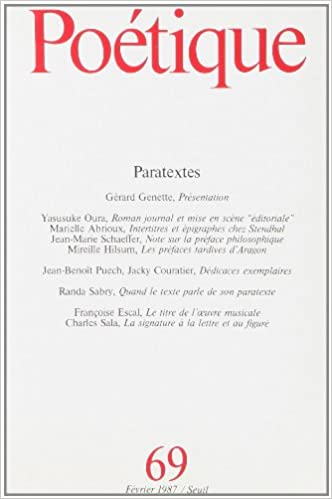
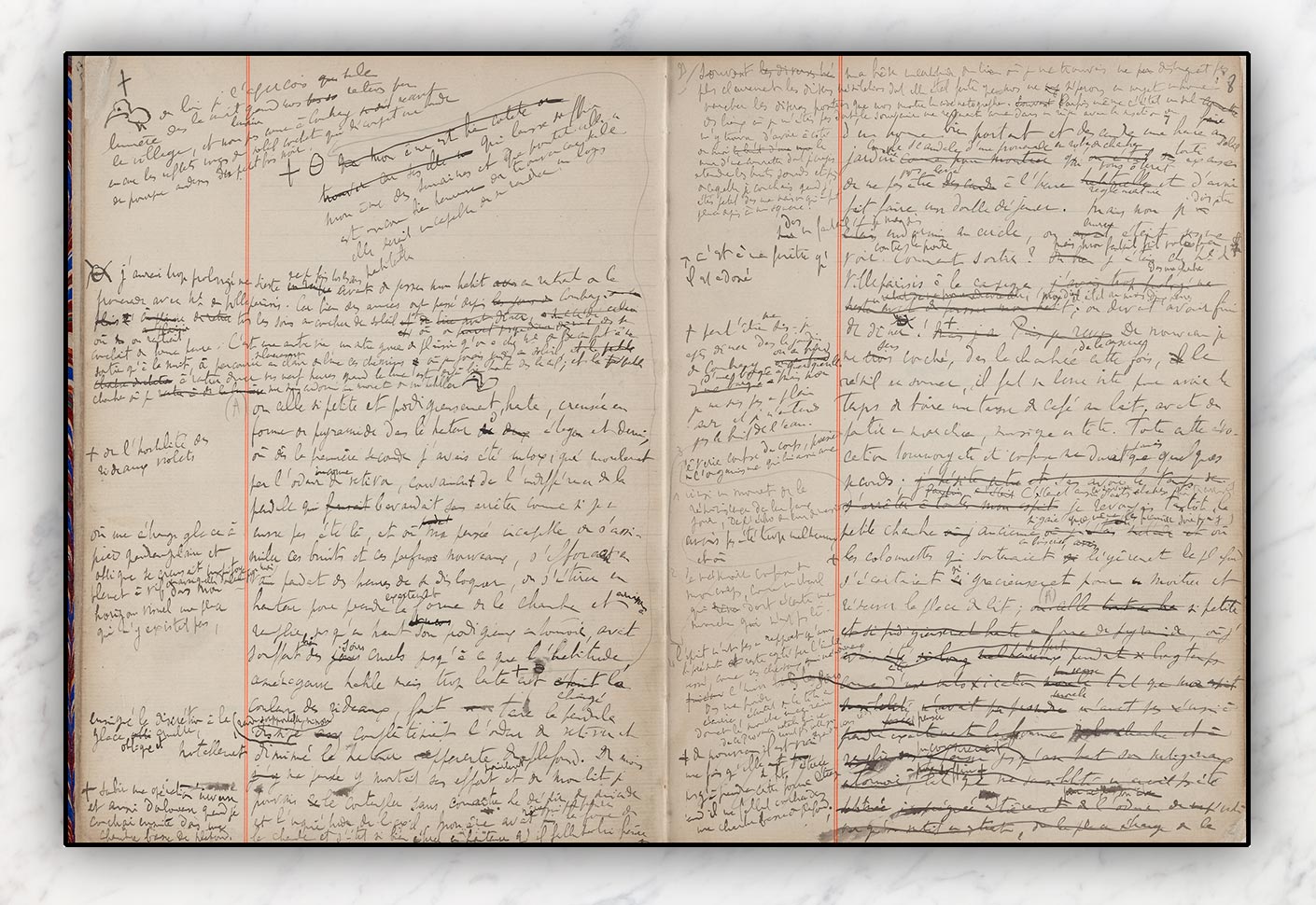
Key concepts of narratology: focalization / free indirect style / narrative voice: who is speaking? / narrative and discourse
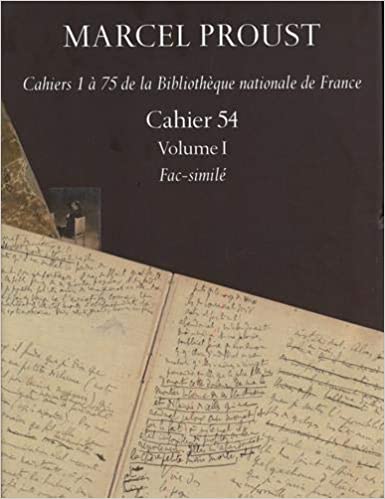
MARCEL PROUST / Modernism Lab
-
- Proust, Marcel, A la recherche du temps perdu [Paris, Gallimard] 1954
Georges Poulet, L'espace proustien. pp. 47-51
Georges Poulet, Proustian Space. pp 30-32
John Ruskin, The Stones of Venice Vol. 1
John Ruskin, The Stones of Venice Vol. II
John Ruskin, The Stones of Venice, Vol III
Henri Bergson, Matter And Memory
Henri Bergson, Time And Free Will
Vittore Carpaccio
Giovanni Battista Piranesi
RECOMMENDED READING:
Richard Howard, in his introduction to Time Regained (Modern Library), says the translation has completed the novel in a way Proust could not (Proust died while revising the three posthumously published novels). Yet the no one knows how the Fugitive was supposed to end. The source texts for the Modern LibraryThe Fugitive and for Time Regained the Montrieff (et al) translations differ from the more the source texts of the more recent Penguin translations. The last nine pages of the Penguin Fugitive has the first nine pages of the Modern Library Time Regained. The Penguin translator follows more recent French single volume editions of la Fugitive aka Albertine disparu and ends in the novel in the same place they do.
E-BOOKS:
In Search of Lost Time, Volume I Swann's Way (A Modern Library E-Book)

Swann's Way In Search of Lost Time, Volume 1 (Penguin Classics Deluxe Edition E-Book)

LISTEN to the original, unrevised Montcrieff translation of Marcel Proust, In Search of Lost Time Complete Volumes read by John Rowe on Audible.com)


FREE ONLINE:
Marcel Proust, Swann's Way Trans Montcrieff, Kilmartin, Enright
In Search of Lost Time: Volume 1 Swann's Way
on archive.org: "Full text of In Search Of Lost Time ( Complete Volumes)," a dipliomatic transcription in html
In Search Of Lost Time (Complete Volumes), a digital facsimile. Both are searchable.
E-books are available for both
the Modern Library
and the more recent and more expensive
Penguin editions,
except for the Penguin translation of Finding Time Again. It is not available as an ebook, but I strongly recommend you get the print paperback of the Penguin edition of Finding Time Again trans. Ian Patterson. I ordered copies through the UF bookstore, but you may have to order a copy through an online vendor.
KEY IDEAS for the FIRST THREE WEEKS of class: complete versus incomplete; metaphor; metonymy; time as a succession of discontinuous moments, not continuous, not duration (past plus present equals eternity); lost time as not past time; essences (vision); (involuntary) memory; parapraxis (Freudian slip); published (posthumously) and unpublished; paradox; the work of art / related vocabulary people, and concepts: Western metaphysics; Plato's allegory of the cave; Henri Bergson; John Ruskin; Richard Wagner; Honoré Balzac; Gustave Flaubert . . .
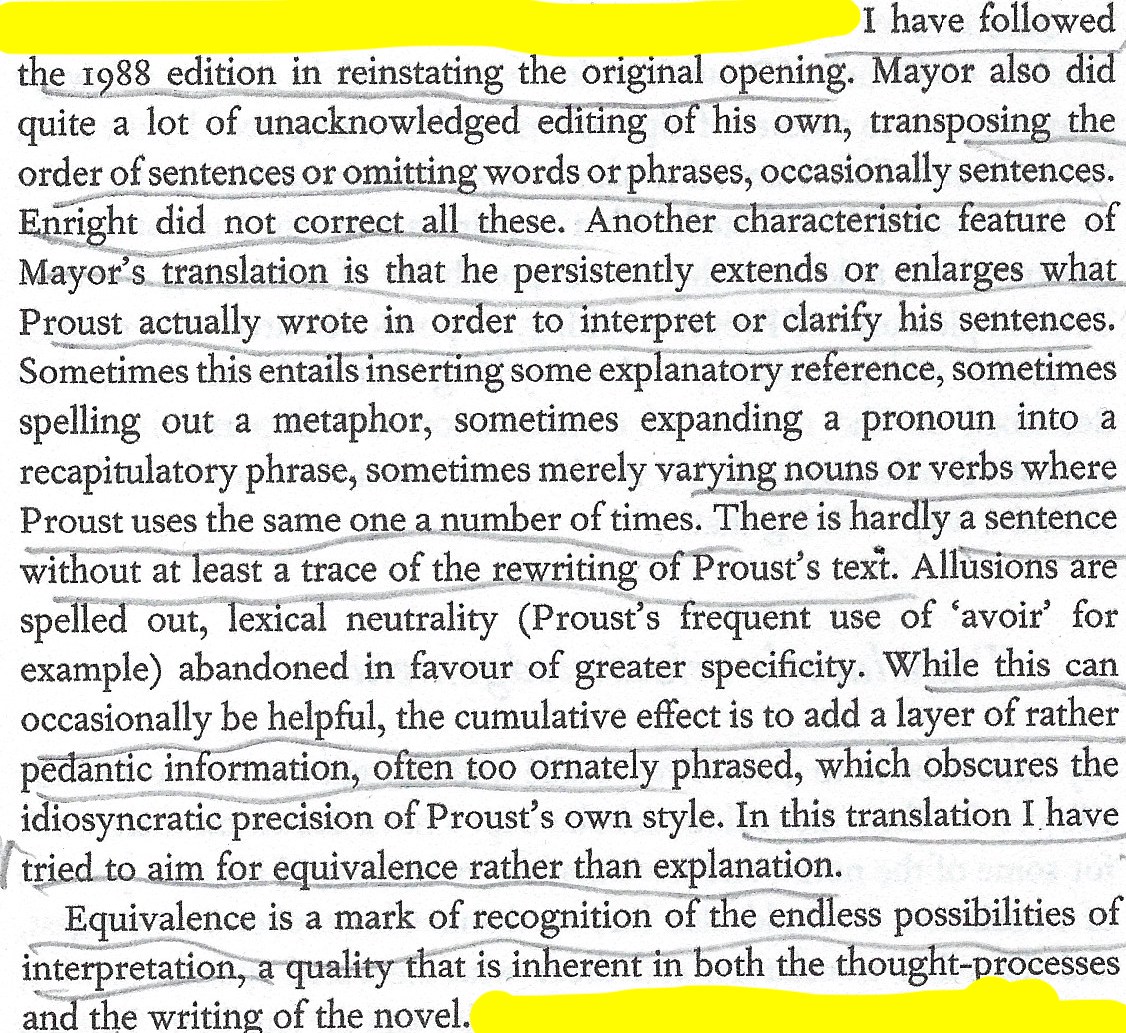
--Ian Patterson , "Introduction" (and Sample Pages) Marcel Proust, Finding Time Again
You may compare some pages from Patterson's translation to the Modern Library translation (on google books) or Amazon.
Some of the Modern Library editions are available on Kindle for as low as 99 cents.
William C. Carter has translated the first four volumes of In Search of Lost Time for Yale UP and trashed both the Penguin translations and the original Montcrieff translations:
William C. Carter "Lost in Translation" Modernism/modernity Johns Hopkins University Press Volume 12, Number 4, November 2005 pp. 695-704
William C. Carter, "Lost in Translation: Proust and Scott Moncrieff"
This scholar has in turn trashed Carter's translations: "Style Over Substance," Boston Review. William Carter revisits the original C.K. Scott Moncrieff translation.
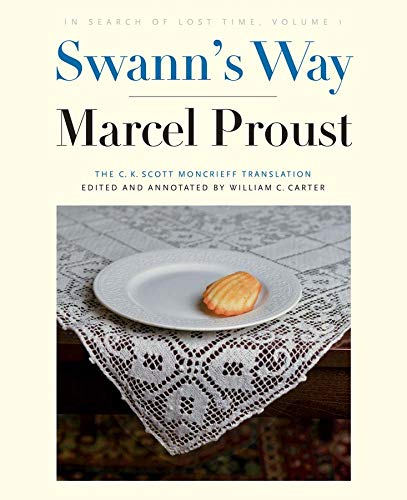
Kinky Proust: Mlle Vinteuil and her friend; the narrator ripping up Charlus' hat in Guermantes
RECOMMENDED READING:
Richard Howard, in his introduction to Time Regained (Modern Library), says the translation has completed the novel in a way Proust could not (Proust died while revising the three posthumously published novels). Yet the no one knows how the Fugitive was supposed to end. The source texts for the Modern LibraryThe Fugitive and for Time Regained the Montrieff (et al) translations differ from the more the source texts of the more recent Penguin translations. The last nine pages of the Penguin Fugitive has the first nine pages of the Modern Library Time Regained. The Penguin translator follows more recent French single volume editions of la Fugitive aka Albertine disparu and ends in the novel in the same place they do.
A Thousand and One Nights are also known as the Arabian Nights. New Arabian Nights (1882) is a collection of short stories by R. L. Stevenson. / New_Arabian_Nights



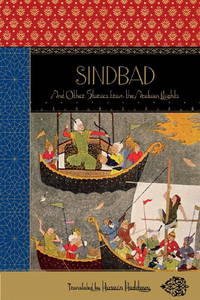
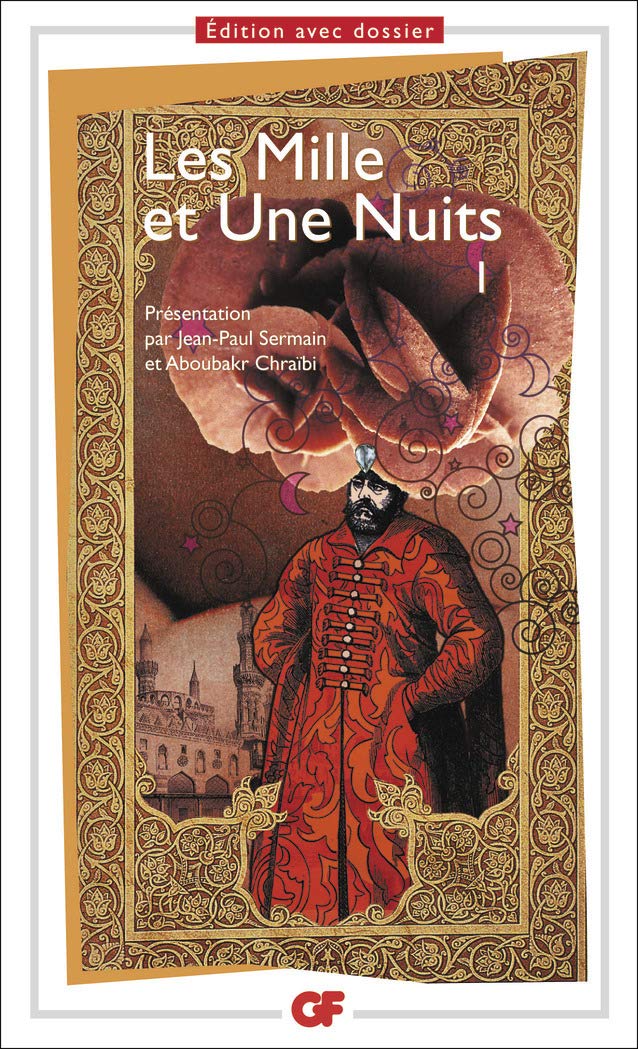
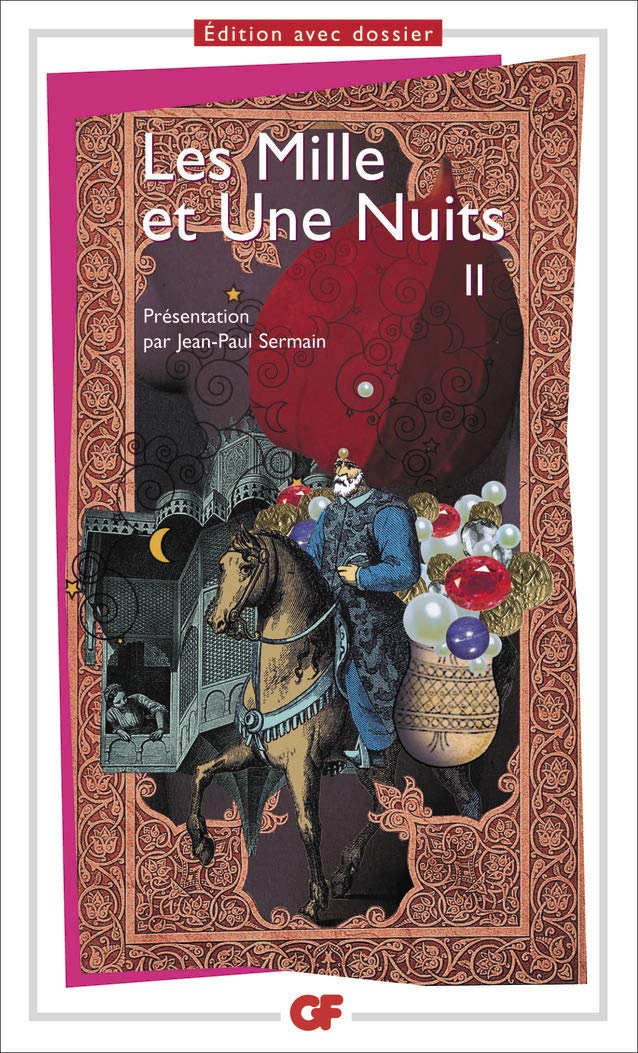
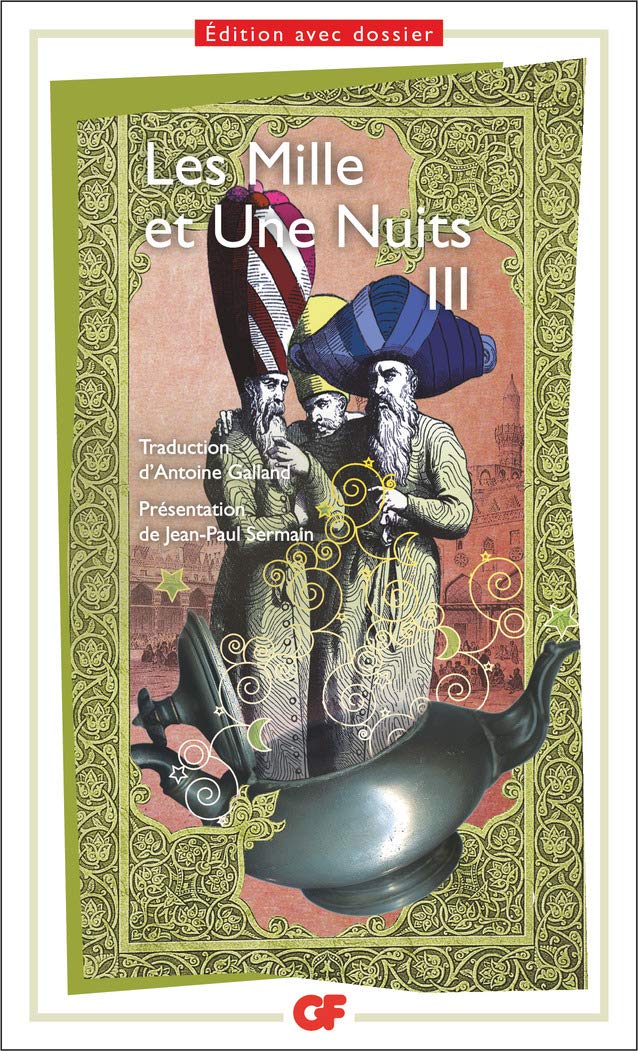
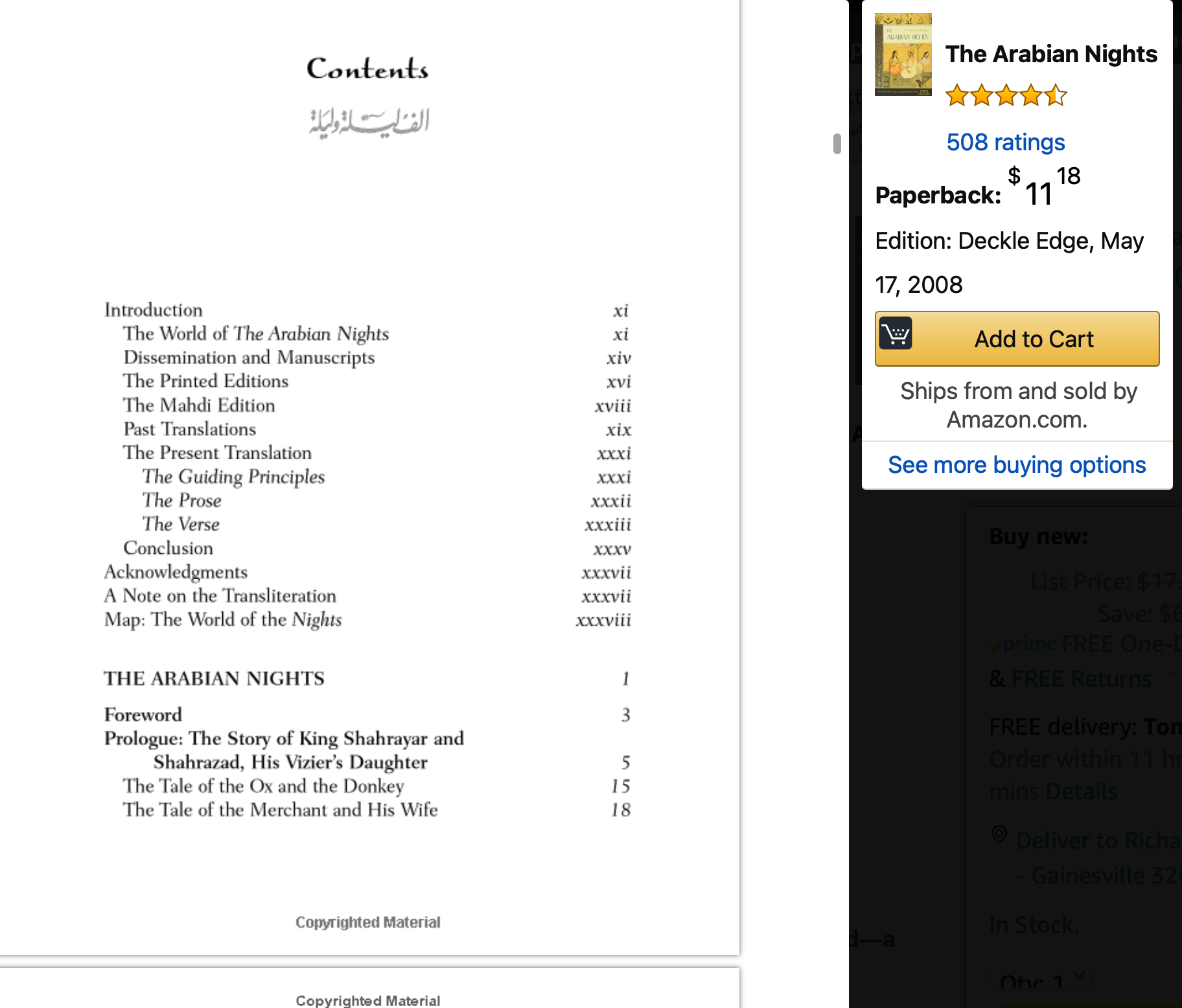
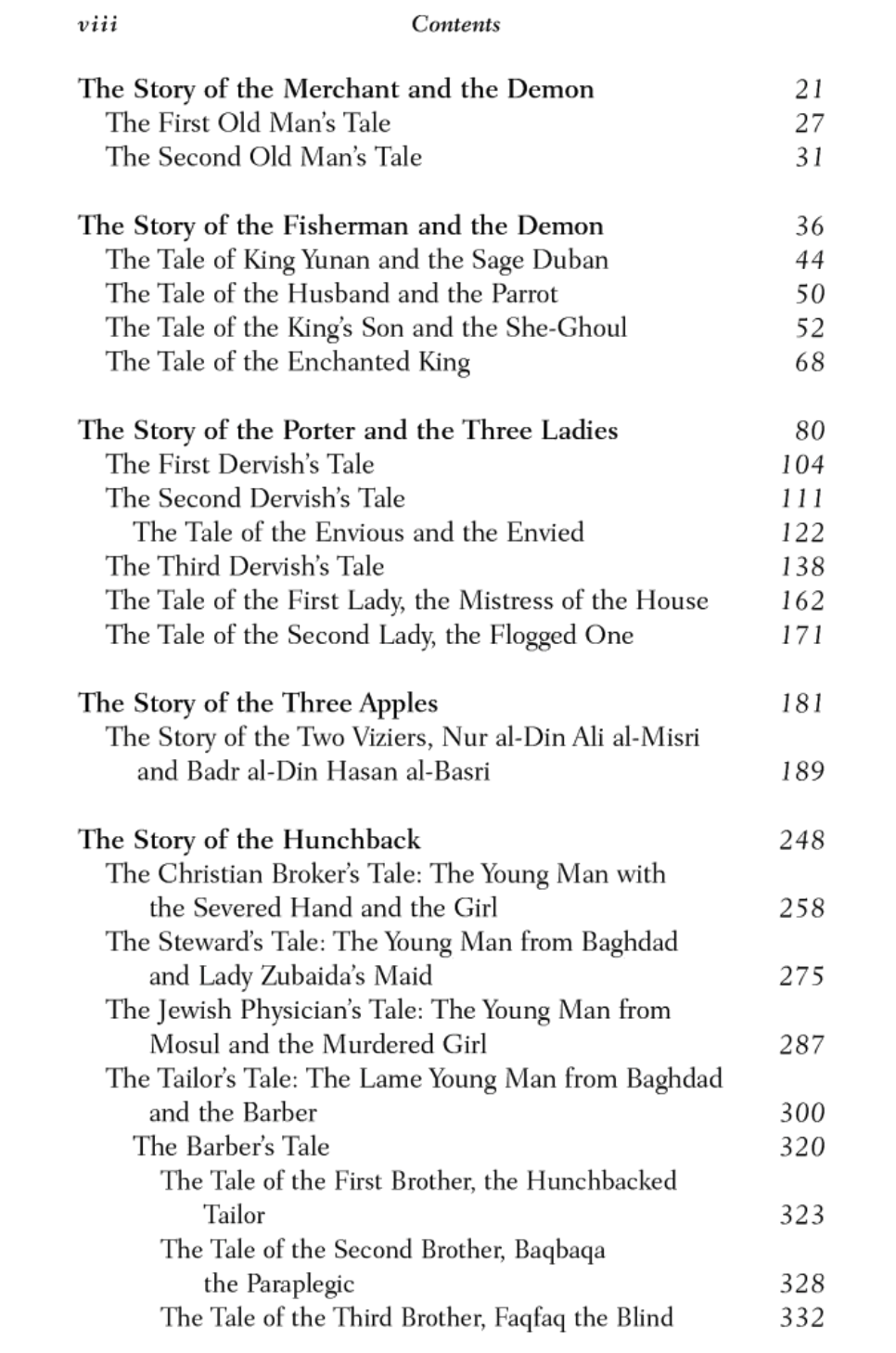
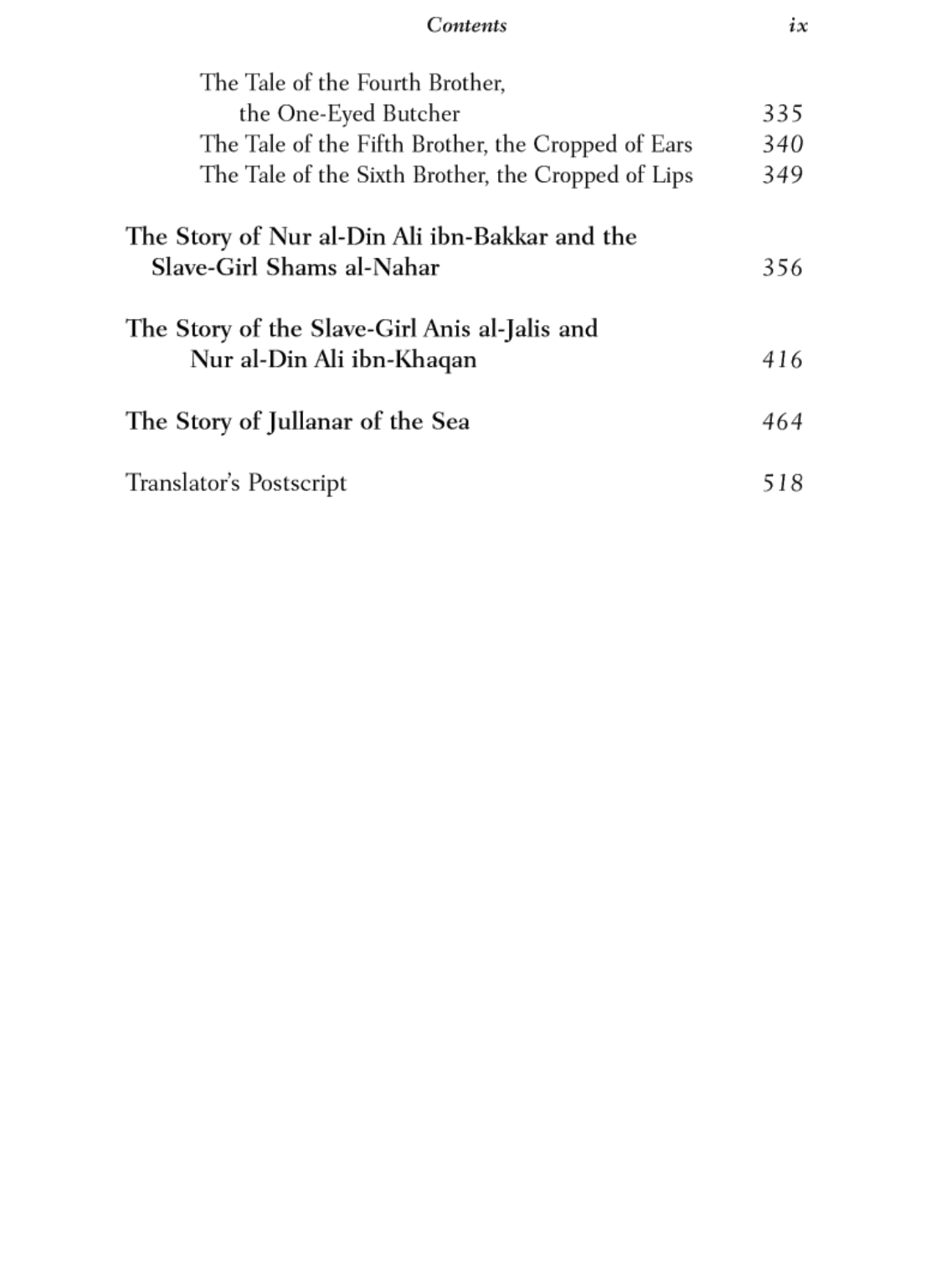
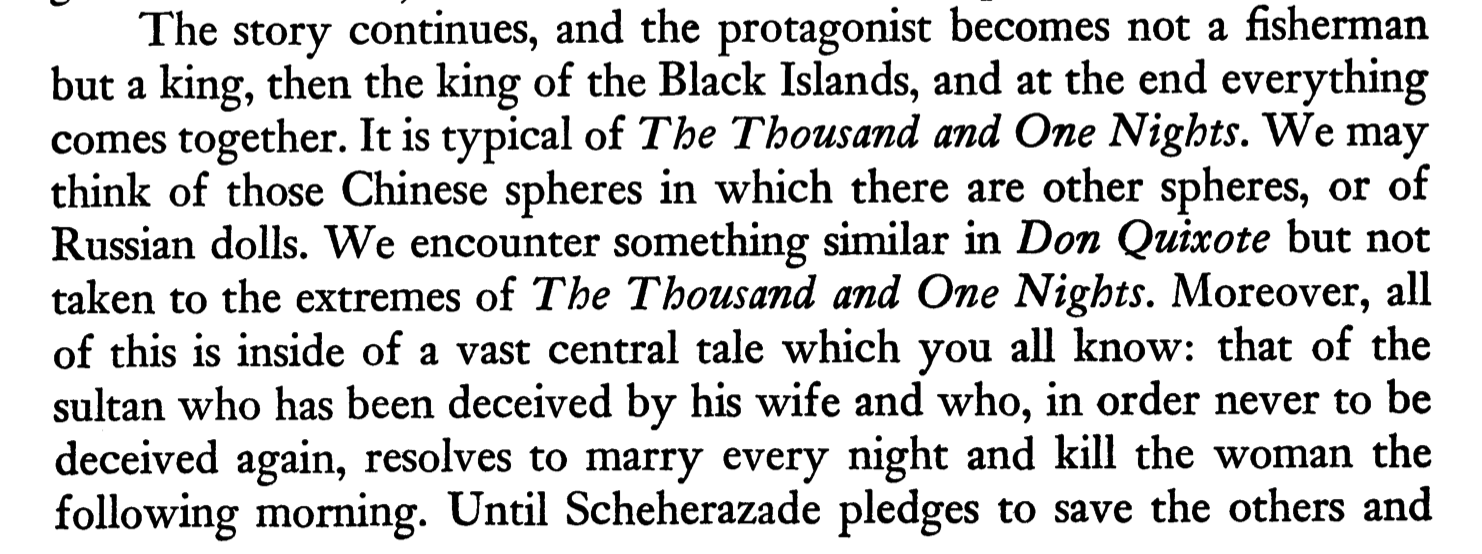
"In many of his comments on Proust, Barthes seems to warn against
an excess of seriousness. Good readings, of this author at least, he suggests,
are light, partial and tangential. Getting the book right is a matter
of seeing the mighty body of the text aslant and askew.“D’une lecture
à l’autre, on ne saute jamais les mêmes passages” (From one
reading to another, one never skips the same passages), he writes in Le
Plaisir du texte (1979). Besides, Proust’s entire undertaking is in a sense
an exercise in idling, he adds in one of the interviews collected
posthumously as Le Grain de la voix (1981), and it would not be in
keeping with the book’s delicious associative textures to read it in an
other than idly pleasure-seeking frame of mind. Repudiating the notion
that he might be thought a Proust “specialist,” he writes, again in
Le Plaisir du texte, “Proust, c’est ce qui me vient, ce n’est pas ce que
j’appelle; ce n’est pas une ‘autorité’” (Proust is that which comes to
me, not that which I call forth; he is not an “authority”). Only scholars
and specialists would want to turn the reading of Proust prematurely
towards long labour and goal-directed linearity. “Je ne suis pas
‘proustien’” (I am not a “Proustian”), he repeats elsewhere in Le Grain
de la voix."--Malcolm Bowie, "Barthes on Proust," The Yale Journal of Criticism, Volume 14, Number 2, Fall 2001, pp. 513-518; to p. 513.
You can find plot summaries or overviews on wikipedia and in these guide books. In some cases, the guide book is longer than Proust's novel.
Patrick Alexander, Marcel-Proust's-Search-for-Lost-Time A-Readers-Guide-to-Remembrance-of-Things-Past (Vintage 2009)
In Search of Lost Time, Volume VI: Time Regained Reader’s Guide
Terence Kilmarten, A Reader's Guide to Proust, available either as a stand alone or compiled and revised by Joana Kilmartin included in the fourth and last volume, Time Regained, of the Modern Library edition
What Happens In Proust
The truth is that the great change brought about by
the war was in inverse ratio to the value of the minds it touched, at all
events, up to a certain point; for, quite at the bottom, the utter fools, the
voluptuaries, did not bother about whether there was a war or not; while
quite at the top, those who create their own world, their own interior life,
are little concerned with the importance of events. What profoundly
modifies the course of their thought is rather something of no apparent
importance which overthrows the order of time and makes them live in
another period of their lives. The song of a bird in the Park of Montboissier,
or a breeze laden with the scent of mignonette, are obviously matters
of less importance than the great events of the Revolution and of the
Empire; nevertheless they inspired in Chateaubriand's Mémoires d'outre
tombe [Memoirs from Beyond the Grave: 1768-1800 ] pages of infinitely greater value.
--Time Regained
Here is the passage from Chateraubriand that Proust is alluding to:
I was roused from my reflections by the warbling of a thrush perched on the highest branch of a birch. This magic sound brought my father’s lands back before my eyes in an instant. I forgot the disasters I had only recently witnessed and, abruptly transported into the past, I saw again those fields where I so often heard the thrushes whistling. When I listened then I was sad, as I am today; but that first sadness was born of a vague desire for happiness: a privilege of the inexperienced. The sadness that I experience presently comes from the knowledge of things weighed and judged. The bird’s song in the woods of Combourg spoke to me of a bliss I was sure I would attain; the same song in the park here at Montboissier reminds me of the days I have lost in pursuit of that old, elusive bliss. There is nothing more for me to learn…. Let me profit from the few moments that remain to me; let me hasten to describe my youth while I can still recall it. A sailor, leaving his enchanted island forever, writes his journal in sight of the land as it slowly slips away. It is a land that will soon be lost.
Memoirs of Chateaubriand, Vol 1
Genette notes that Proust uses the word "palimpsest" twice in the Recherche.
The smallest facts, the most trivial happenings, are only the outward signs of an idea which has to be elucidated and which often conceals other ideas, like a palimpsest.
--The Guermantes Way
My father spoke to him of it again, as often as we met him, and tortured him with questions, but it was labor in vain: like that scholarly swindler who devoted to the fabrication of forged palimpsests a wealth of skill and knowledge and industry the hundredth part of which would have sufficed to establish him in a more lucrative — but an honorable occupation, M. Legrandin, had we insisted further, would in the end have constructed a whole system of ethics, and a celestial geography of Lower Normandy, sooner than admit to us that, within a mile of Balbec, his own sister was living in her own house; sooner than find himself obliged to offer us a letter of introduction, the prospect of which would never have inspired him with such terror had he been absolutely certain — as, from his knowledge of my grandmother’s character, he really ought to have been certain — that in no circumstances whatsoever would we have dreamed of making use of it.
--Swann’s Way
Swann in Love the Vinteuil Sonata; the carriage trip with Odette and her camelias.
Place Names: the Name
The people who frequent the Champs-Élysées
The particular characteristic of the exordium of the Recherche is obviously its multi-
plication of memory-created instances, and consequently its
multiplication of beginnings, among which each (except the last)
can seem afterward like an introductory prologue. First begin-
ning (absolute beginning): "For a long time I used to go to bed
early ..." Second beginning (ostensible beginning of the au-
tobiography), five pages later: "At Combray, as every afternoon
ended ..." Third beginning (appearance on stage of involun-
tary memory), twenty-six pages later: "And so it was that, for a
long time afterwards, when I lay awake at night and revived old
memories of Combray ..." Fourth beginning (resumption after
the madeleine, real beginning of the autobiography), four pages
later: "Combray at a distance, from a twenty-mile radius ..."
Fifth beginning, one hundred and seven pages later: ab ovo,
Swann in love (an exemplary novella if there ever was one, ar-
chetype of all the Proustian loves), conjoint (and hidden) births
of Marcel and Gilberte ("We will confess," Stendhal would say
here, "that, following the example of many serious authors, we
have begun the story of our hero a year before his birth." Is not
Swann to Marcel, mutatis mutandis and, I hope, with nothing
untoward in mind, what Lieutenant Robert is to Fabrice del
Dongo?) 16 — fifth beginning, thus: "To admit you to the 'little
nucleus,' the 'little group,' and 'little clan' at the Verdurins' ..."
Sixth beginning, one hundred and forty-nine pages later:
"Among the rooms which used most commonly to take shape
in my mind during my long nights of sleeplessness. . ." im-
mediately followed by a seventh and thus, as it should be, a final
beginning: "And yet nothing could have differed more utterly,
either, from the real Balbec than that other Balbec of which I had
often dreamed ..." This time, the movement is launched: after
this it will never stop.
--Gérard Genette on the seven beginnings of Swann's Way

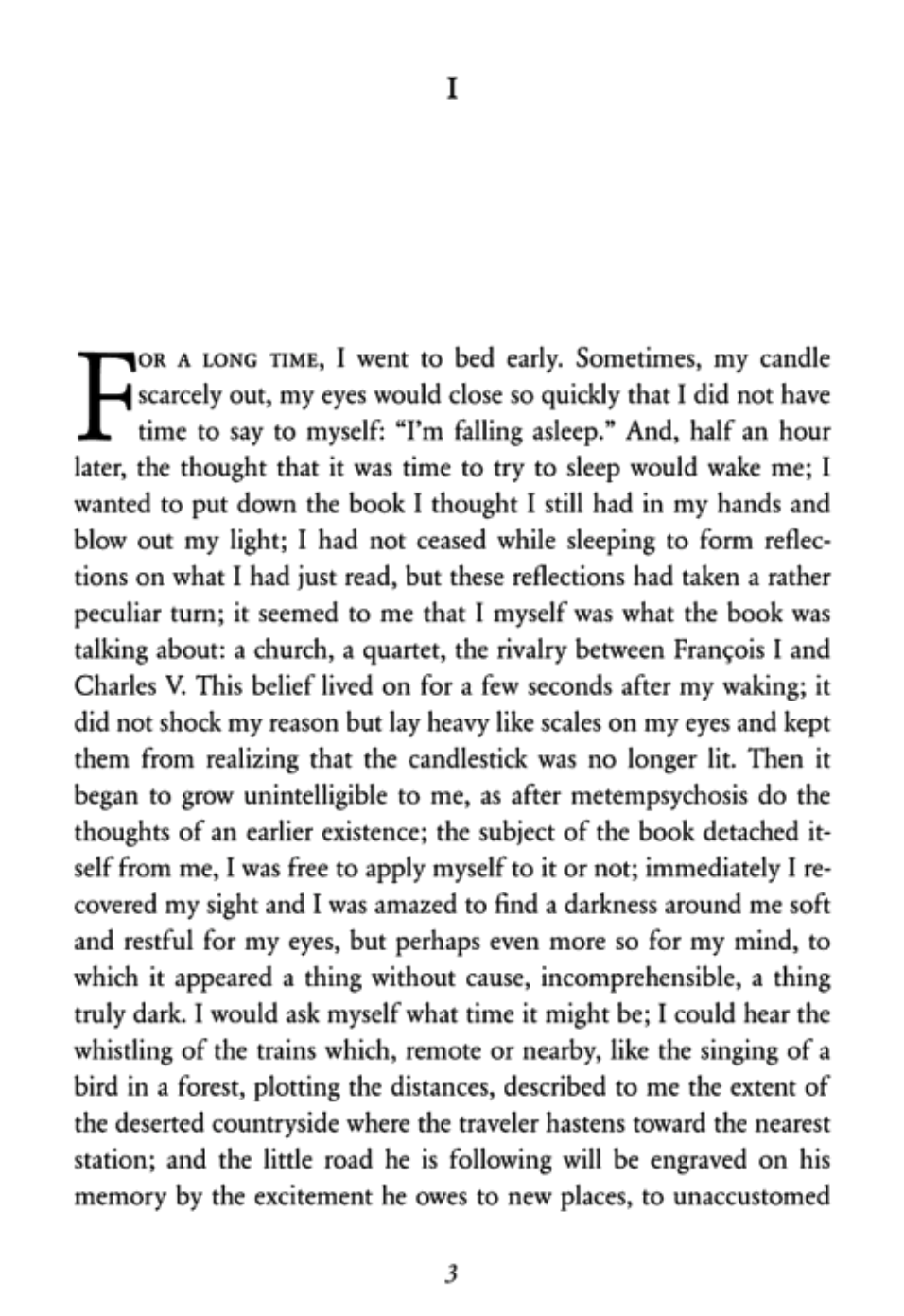
The first page of Swann's Way
MARCEL PROUST, PASTICHES ET MÉLANGES
- JOURNÉES
DE LECTURE TABLE DES MATIÈRES PASTICHES
L'AFFAIRE LEMOINE I. Dans un Roman de Balzac II. L'«Affaire Lemoine», par Gustave Flaubert III. Critique du roman de M. Gustave Flaubert sur l'«Affaire Lemoine», par Sainte-Beuve, dans
son feuilleton du Constitutionnel IV. Par Henri de Régnier V. Dans le «Journal des Concourt» VI. L'«Affaire Lemoine», par Michelet VII. Dans un feuilleton dramatique de M. Émile Faguet VIII. Par Ernest Renan IX. Dans les Mémoires de Saint Simon MÉLANGES EN MÉMOIRE DES ÉGLISES ASSASSINÉES I. Les Églises sauvées. Les Clochers de Caen. La
Cathédrale de Lisieux.
Journées en Automobile II. Journées de Pèlerinage.
Ruskin à Notre-Dame d'Amiens, à Rouen, etc. III. John Ruskin
La Mort des Cathédrales SENTIMENTS FILIAUX D'UN PARRICIDE
JOURNÉES DE LECTURE
Montcrieff translation on the left (the title "Overture" is his) and Davis translation on the right.
"In many of his comments on Proust, Barthes seems to warn against
an excess of seriousness. Good readings, of this author at least, he suggests,
are light, partial and tangential. Getting the book right is a matter
of seeing the mighty body of the text aslant and askew.“D’une lecture
à l’autre, on ne saute jamais les mêmes passages” (From one
reading to another, one never skips the same passages), he writes in Le
Plaisir du texte (1???). Besides, Proust’s entire undertaking is in a sense
an exercise in idling, he adds in one of the interviews collected
posthumously as Le Grain de la voix (1???), and it would not be in
keeping with the book’s delicious associative textures to read it in an
other than idly pleasure-seeking frame of mind. Repudiating the notion
that he might be thought a Proust “specialist,” he writes, again in
Le Plaisir du texte, “Proust, c’est ce qui me vient, ce n’est pas ce que
j’appelle; ce n’est pas une ‘autorité’” (Proust is that which comes to
me, not that which I call forth; he is not an “authority”). Only scholars
and specialists would want to turn the reading of Proust prematurely
towards long labour and goal-directed linearity. “Je ne suis pas
‘proustien’” (I am not a “Proustian”), he repeats elsewhere in Le Grain
de la voix."
Malcolm Bowie, "Barthes on Proust," The Yale Journal of Criticism, Volume 14, Number 2, Fall 2001, pp. 513-518; to p. 513.
Roland Barthes, "Proust Longtemps . . . "
Roland Barthes, "Proust and Names"
Many people try to read Swann's Way presumably because it is such a famous novel. Most of them fail. Why? Partly because the novel is very difficult. It has famously long sentences. There is little by way of plot. Pages and pages are devoted to a small incident. For descriptions of examples, see this humorous report:

I think it is safe to say that every reader will share this critic's experience, though not his exasperated response. What is going on?
In most classes on a novel, students are told to read the novel the same way they would read any book, namely, from beginning, starting on the first page, and ending on the last. A critical edition would supply annotations, and guides to the Recherche include summaries, quotations, and commentaries. Everything is directed toward basic reading comprehension. This kind of reading is criticism at it its most basic, and although limited, it has the benefit of being very close to the text. we will be doing what Gérard Genette calls "structured reading." Instead of reading the Recherche head on by reading it in order, we will overcome its difficulty by reading it out of order, breaking up Swann's Way with digressions, so to speak, into literary theory (mostly essay and boook chapters by Genette), and leaping ahead to the last novel, Time Found Again, aka Time Regained. We will read also read scenes from other novels related to the title of this course that bear on the novel's completion and incompletion. By proceeding in this eccentric manner, we will be able to read the Recherche in two ways, attending not only to any one of the seven novels we are reading but also gaining a sense of that novel relates to the Recherche as a whole. And we will then be in a positition to ask not only what is Proustian but the more interesting and challenging question, What is Proustian about Proust?
At the end of the semester I’ll have each trace a character through all of the novel including the parts we skipped and give a synopsis in class. They’ll also have to provide a table of contents to their synopsis like the Proust does at the end of each volume. And I’ll assign different plot summaries for each volume. Take maybe the last four weeks. And in the two hour block I would present previously unread passages we can read aloud and then close read.
NOTE BENE: THIS IS LARGELY AN IMMERSIVE COURSE IN MONOTASKING, READING THREE VOLUMES OF MARCEL PROUST'S FAMOUS NOVEL IN SEARCH OF LOST TIME, ONE OF THE GREATEST OF ALL NOVELS, FROM THE VIEWPOINT OF GéRARD GENETTE'S WORK ON NARRATOLOGY. READING PROUST WILL BE DEEPLY REWARDING. IT WILL ALSO BE A LABOR INTENSIVE, TIME CONSUMING PROCESS THAT DEMANDS YOUR TOTAL CONCENTRATION FOR LONG PERIODS OF TIME. WORK WILL BE DUE BEFORE EACH CLASS MEETING. To do the assigned listenings, pass the quizzes at the beginning of each class, and write thoughtful discussion questions on the readings, you will have to spend five to six hours a week OUTSIDE of class preparing for class discussion. YOU WILL ALSO HAVE TO READ THE TEXT CLOSELY, PAYING ATTENTION TO CHARACTER DEVELOPMENT, SENTENCE STRUCTURE, VOCABULARY, THE FLUID MODERNIST STRUCTURE OF THE NOVEL. (It's known as a roman-fleuve, or series of novels that make up a single, larger novel; "fleuve" in French means "river" or "stream.") INFORMATION ABOUT THE AUTHOR OR THE HISTORICAL BACKGROUNDOF THE NOVEL MAY BE FOUND ON WIKIPEDIA. ALTHOUGH WE WILL CONSIDER FROM TIME TO TIME WHAT MAY HAVE BEEN PROUST'S (INVOLUNTARY) BLUNDERS, WE WILL PRIMARILY DISCUSS THE NOVEL AND ONLY THE NOVEL IN ORDER TO UNDERSTAND IT AND Gérard Genette's WORK ON NARRATOLOGY that is primarily devoted to Proust. See Genette's Narrative Discourse, p. 124; 184.
Novel of ideas / philosophy as experience
C'était, en effet, sous cette forme trop simple que je jugeais mon aventure avec Albertine, maintenant que je ne voyais plus cette aventure que en dehors.
Le Temps retrouvé (Pléiade edition) Vol. 4, p. 285
"It was in this too simple form that I judged my affair with Albertine at a time when I only
saw it from the outside."
----Time Regained, Trans. Stephen Hudson
"This was the excessively simple light in which I regarded my adventure with Albertine, now that I saw it only from outside."
Time Regained, Trans. C. K. Montcrieff et al p. 23
"It was, indeed, in this over-simplied form that I regarded my adventure with Albertine, now that I could only
see it from the outside."
--Finding Time Again, Trans. Ian Patterson, p. 13
Learning French Pronunciation (Proust translated English into French and was very sensitive to the sounds of words.)
Remembrance of Things Past V 2. The Guermantes way. Cities of the plain (1981)
Trans. Scott Montcrieff; Terence Kilmartin
https://www.deepl.com/translator
Key concepts of narratology: focalization / Genette, Gérard (1972). "Discours du récit." G. Genette. Figures III. Paris: Seuil, 67–282 / Narrative Discourse: An Essay on Method, pp. 189-94; Gérard Genette on narrative and discourse in "Boundaries of Narrative," Trans. Ann Levonas. New Literary History, Autumn, 1976, Vol. 8, No. 1, Readers and Spectators: Some Views and Reviews (Autumn, 1976), pp. 1-13; to pp. 8-12; free indirect style / narrative voice: who is speaking? "Voice in Narrative Discourse: An Essay on Method, pp. 212-62.
Gérard Genette, "Fictional Narrative, Factual Narrative," Trans. Nitsa Ben-Ari, Brian McHale. Poetics Today, Vol. 11, No. 4, Narratology Revisited II (Winter, 1990), pp. 755-774.
"In arguing against short commentaries on individuall passages from Remembrance of Things Past,
one might say that with Proust's bewilderingly rich and intricate creation the reader is more in need of an orienting
overview than of something that entangles him still more deeply in
details-from which the path to the whole is in any case difficult and
laborious. This objection does not seem to me to do justice to the matter.
We are no longer lacking in grand surveys of Proust. In Proust, however,
the relationship of the whole to the detail is not that of an overall
architectonic plan to the specifics that fill it in: it is against precisely that,
against the brutal untruth of a subsuming form forced on from above,
that Proust revolted.
. . . I do not want merely to point out the ostensible high points
of his work, nor to advance an interpretation of the whole that would at
best simply repeat the statements of intention which the author himself
inserted into his work. Instead, I hope through immersion in fragments
to illuminate somethi ng of the work's substance, which derives its unforgettable
quality solely from the coloring of the here and now. I believe I
will be more faithful to Proust's own intention by proceeding in this way
than by trying to distill it and present it in abstract form.
--Theodor Adorno, "On Proust," Notes to Literature Vol 2, 317
"One should never bear grudges against people, never judge them by the memory of one unkind act, for we can never know all the good resolves and effective actions of which their souls may have been capable at another time. And so, even from the simple point of view of foresight, we make mistakes. For no doubt the bad pattern we observed on that one occasion will recur. But the soul is richer than that, has many other patterns which will also recur in the same man, yet we refuse to take pleasure in them because of one piece of bad behavior in the past."
The Prisoner, trans. Carol Cook, p. 311
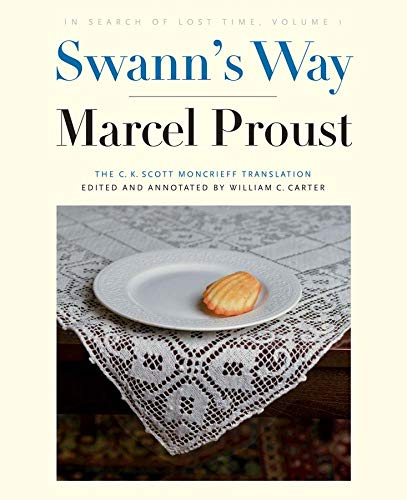

Swann in Love (Oxford World's Classics, 2018) Bryan Nelson (Translator)Marcel Proust, Swann in Love, Swann's Way: In Search of Lost Time, Vol. 1 (Penguin, 2004) Lydia Davis (Translator )

REQUIRED LISTENING: (Listen to chapters 5-6 of the original, unrevised Montcrieff translation of Marcel Proust, In Search of Lost Time Complete Volumes read by John Rowe) Proust, Swann's Way, Modern Library editionMarcel Proust, Combray, Swann's Way (the original Montcrieff translation: Susanna Lee, Ed. Norton Critical Editions, 2013)
Proust, Swann's Way, Modern Library editionMarcel Proust, Combray, Swann's Way (the original Montcrieff translation: Susanna Lee, Ed. Norton Critical Editions, 2013)
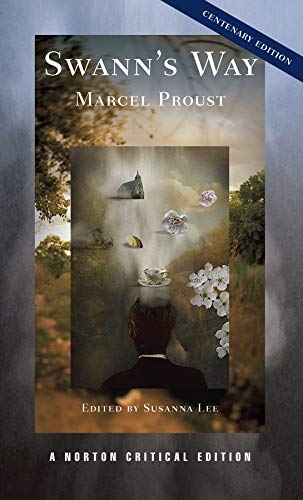

In Class Exercises: Listening comprehension: transcribe what you hear and punctuate it as well as you can.Reading Comprehension: copy what you read word for word.Marcel Proust, The Overture, Swann's Way (Montcrieff invented the "Overture," combining the opening about Marcel's insomnia and the famous madeleine episode.)Where does one passage end and another begin?Marcel Proust, Swann's Way, Ch1_2 Trans. Lydia DavisRecommended Reading:Marcel_Proust, On_Reading

Marcel Proust, The Lemoine Affair. Read the linked pdf and read for free pp. 9-22 online here with "look inside." (TRANSLATOR CHARLOTTE MANDELL)The narrator's involuntary memories of life at Combray, the most notable being his insomnia anda madeleine dipped in a cup of tea. But see Samuel Beckett (pp. 32-35) on listening to the Venteuil Sonata as more central than the madeleine episode. "Intermintencies of the Heart" (in n is the most important part of the novel, according to Beckett. It includes an involuntary memory of the grandmother. Who is speaking? The "I" that is not "me." Free Indirect Dicourse"The number of pawns on the human chessboard being less than the number of combinations that they are capable of forming, in a theatre from which all the people we know and might have expected to find are absent, there turns up one whom we never imagined that we should see again and who appears so opportunity that the coincidence seems to us providential, although no doubt some other coincidence would have occurred in its stead had we been not in that place but in some other, where other desires would have been born and another old acquaintance forthcoming to help us to satisfy them.”
The Guermnates Way
Proust and the Past and Imperfect Tenses:
The first sentence is one of the very few sentences written in the past tense (passé composé)
“Longtemps, je me suis couché de bonne heure."
“For a long time I used to go to bed early.” Scott Moncrieff-Terence Kilmartin
"For a long time, I went to bed early." Lydia Davis
"For a long time I would go to bed early."
“Time was when I always went to bed early." James Grieve; Richard Howard (translating Roland Barthes' "Longtemps, je me suis couché de bonne heure.")
“Time and again, I have gone to bed early.” Richard Howard
See Samuel Beckett on listening to the Vinteuil Sonata as being more central than the madeleine episode. "Intermintencies of the Heart" (in Sodom and Gomorrah) is the most important part of the novel, according to Beckett. It includes an involuntary memory of the grandmother.
Inspirations for the imaginary Vinteuil sonata:
César Franck-Violin Sonata in A Major (Complete)
A la recherche de la sonate de Vinteuil - Julie Depardieu
Franck, Debussy, Fauré, Wagner, Saint-Saens, Gabriel Pierné, Renal Duan
A Proust Playlist
Antoine Compagnon, "Proust Between Two Centuries"
In Search of Last Time considered as a Bildungsroman--the narrator discovers his vocation as a writer; autobiography; fiction (Marcel the "I," or narrator is not Marcel the "me," or the writer; a soap opera (scheming and social climbing); a satire of the Belle Époque, French High Society (circa. 1880-1914), and more.
Journal entries: I will ask you to keep a journal of your listening / readings of Swann's Way. Keep all entries in one word docoument. Cut and paste three passages from the assigned reading and put them into your document by 5:00 p.m. You will see that Proust's "Synopsis" breaks the novel up into small parts and gives them each a short description, kind of like a cross between a table of contents and an index. Break up the novel your own way based on either the sentence or the narrative structure and provide brief desriptions of your own for them. Each journal entry is due each Friday by 5:00.
DQs are due Mondays and Wednedays by 5:00 p.m. along with three BIG WORDS. Email all work for the course to me at [email protected] I want you to learn how to write your DQs in a Proustian style over the semester. As you write about the novel, imagine you are writing an autobiography and a novel about your memories of reading in the style of the novel. When we finish the semester, you will have a collection of quotations, fragments of your search for time you lost reading the three assigned volumes of Proust's seven volume novel.
First Paper Topic
What is a typo? What is a Freudian Slip?
--Jacques Derrida, "De Tout," in The Post Card
What is an author's blunder?
--Richard Peavar, "The Translator's Inner Voice," in Translating Music, pp. 31-3.
"Every reader is, while he is reading, the reader of his own self."
Recherche
As well as being famously long, Proust is also often thought of as boring. Is this true, and will we get through this first volume?
https://www.amazon.com/gp/product/B085DQB8YQ/
Georges Bataille, Proust
Roland Barthes, "Longtemps . . . "
Gérard Genette Fiction and Diction
Did Gide Read Proust? NY Times
Gilles Deleuze, Proust and Signs
Gérard Genette, Essays in Aesthetics
Gérard Genette, Mimologics
Gérard Genette, "Proustian Paratexte"
Gérard Genette, "Boundaries of Narrative," trans. Ann Levonas New Literary History, Autumn, 1976, Vol. 8,
Gérard Genette, Figures III
Emmanuel Levinas "The Other in Proust"
Leslie Hill, "Reading Proust "
Paul_Valery, Monsieur Teste
Marcel Proust, On Reading
Barthes, Proust
Auerbach, Mimesis Proust
Adorno, On Proust
Adorno, Proust Commentaries
Gérard Genette, "Paul Valery Literature as Such"
TENTATIVE SCHEDULE (Please expect minor adjustments to be made in the schedule from time to time; all changes will be announced both in class and on the class email listserv.)
AUGUST 24: No Writing Off the Writer, However Bad
Sainte-Beuve championed a form of biographical criticism that saw texts as morally and intellectually inseparable from their writers. Sainte-Beuve . . . rank[ed] Bernard, Vinet, Molé, Verdelin, Meilhan, and Azyr among the great writers of his time, . . . dismiss[ed] Baudelaire and Balzac as vulgar and Hugo as overly political. History has not been on Sainte-Beuve’s side, and neither was Proust. A la recherche, the novel that grew out of [Contre Sainte-Beuve] this early piece of literary criticism, persuasively refutes Sainte-Beuve’s method by bringing into contrast the sometimes sordid lives of its characters and the emotional nuance of their experiences of the world.
Marcel Proust, Contre Saint-Beuve
Diaectical contradiction of Proust's criticism of Saint-Beuve, Walter Benjamin's "The Image of Proust":
Walter Benjamin, "On the Image of Proust, in Walter Benjamin, Selected Writings Volume 2 part 1 1927-1930, 237-47
"Read as the straightforward discursive text it pretends to be, the essay falls short of the demands currently made on literary criticism. It presents itself as a loose succession of biographical anecdote and casual commentary, which attempts to penetrate 'to the heart of the Proustian world' (p. 365), by giving the reader apparent access, through the literary work, to the society, the philosophical thought, and the author behind the text. Yet the repeated contradiction and discrepancy that arise from these attempts at penetration offer no sure key to the mastery of Proust's work, and the hermeneutic rigor which the reader of criticism has come to expect remains conspicuously lacking.
It would be of the text to its own self contradiction. Yet if one writes oneself into the logic of Benjamin's metaphorical web, the text itself accounts for the discrepancies which seem to unfold. The theoretical statement which arises out of such a reading, as oblique and self-negating as it may have to be, may violate the conventional notions of the literary text, the critical text and the basis for their distinction, but violates them with rigor. Benjamin, like others before him, dissolves an old genre (literary criticism) in order to found a new one, which combines fiction and commentary."
Carol Jacobs, "Walter Benjamin: Image of Proust," MLN Vol. 86, No. 6, Comparative Literature (Dec., 1971), pp. 910-932
Note: Don't go with dogma, just way. Be on the look out for the dialectical contradiction that enables you to rethink your earlier take.
Consider the narrator's account of Morel in Sodom and Gomorrah. Morel is not "wicked through and through" but "full of contradictions," a phrase the narrator uses twice. The narrator compares Morel to a book from the Middle Ages and to sheets of papers. Morel's cultural literacy is the measure of his contradictions: he can quote a line from a letter to Chateaubriand--"work, work, and achieve reknown" and a "stupid" maxim.
Moral imagination is not just cancel (stupid) don't cancel (smart) but exploring ways knowledge of a person (character) registers the range and limits of that character's morality. Morel is dirven by money but is not entirely evil. But his contradictions hardly excuse him. They are a kind of weak excuse that allows the narrator to enjoy telling us how bad Morel is. The narrator's own moral imagination, its range and its limit are defined by the narrator's account of Morel. Several characters know one or two expressions. That's a recurrent joke the narrator uses.
After the radio broadcast of "Short Commentaries on Proust," I received
letters of protest about my allegedly excessive use of foreign words
for the first time since my youth . I looked through the text of the talk
and found no unusual number of foreign words in it, although people
may have held some French expressions that arose in connection with the
French subject matter against me. Thus I can hardly explai n the outraged
correspondence except through the contrast between literary texts and
their interpretation . With great narrative prose, interpretation easily
takes on the coloration of the foreign word. The syntax may sound more
foreign than the vocabulary. Attempts at formulation that swim against
the stream of the usual linguistic splashing in order to capture the
intended matter precisely, and that take pains to fit complex conceptual
relationships into the framework of syntax, arouse rage because they
require effort. The person who is naive about language will ascribe the
strangeness of such writing to the foreign words, which he holds responsible
for everything he doesn't understand even when he is quite familiar
with the words. Ultimately, what is going on is largely a defense against
ideas, which are imputed to the words; the blame is misdi rected. I once
tested this in America when I gave a disconcerting lecture to an emigre
association to which I belonged, a lecture from which I had carefully
eliminated every foreign word. Nevertheless, the lecture met with precisely
the same opposition I am now encountering in Germany. I have
had this kind of experience si nce my childhood , when old Dreibus, a
neighbor who lived on my street, attacked me in a rage as I was
conversing harmlessly with a comrade in the streetcar on my way to
school: "You goddamned little devil! Shut up with your High German
and learn to speak German right. " I had scarcely recovered from the
fright Herr Dreibus gave me when he was brought home in a pushcart
not long afterwards, completely i ntoxicated, and it was probably not
much later that he died. He was the first to teach me what Ra"cu"e [from
the French , meaning rancor or spite] was, a word that has no proper
native equivalent in German, unless one were to confuse it with the word
Resenttiment [resentment], a word currently enjoying an unfortunate
popularity in Germany but which was likewise imported rather than
invented by Nietzsche. In short, it is a case of sour grapes: outrage over
foreign words is to be explained in terms of the psychic state of the one
who is angry for whom some grapes are hanging too high up. .. .
I have chosen the examples for this analysis from a text of my own, not
because I consider the text exemplary but because I am more aware of the decisive considerations and can explain them better
than those of other authors. I will refer intentionally to the "Short
Commentaries on Proust" that brought the protests.
Adorno, "Words from Abroad," in Notes to Literature
In arguing against short commentaries
on individuall passages from Remembrance of Things Past, one might say that
with Proust's bewilderingly rich and intricate creation the reader is more in need of an orienting
overview than of something that entangles him still more deeply in
details-from which the path to the whole is in any case difficult and
laborious. This objection does not seem to me to do j ustice to the matter.
We are no longer lacking in grand surveys of Proust. In Proust, however,
the relationship of the whole to the detail is not that of an overall
architectonic plan to the specifics that fill it in: it is against precisely that,
against the brutal untruth of a subsuming form forced on from above,
that Proust revolted. Just as the temperament of his work challenges
customary notions about the general and the particular and gives aesthetic
force to the dictum from Hegel's Logic that the particular is the general
and vice versa, with each mediated through the other, so the whole,
resistant to abstract outlines, crystallizes out of intertwined individual
presentations. Each of them conceals within itself constellations of what
ultimately emerges as the idea of the novel. Great musicians of Proust's
era, like Alban Berg, knew that living totality is achieved only through
rank vegetal proliferation. The productive force that aims at unity is
identical to the passive capacity to lose oneself in details without restraint
or reservation. In the inner formal composition of Proust's work, however-
and it was not only on account of its long, obscure sentences that
Proust's work struck the Frenchmen of his time as so German-there
dwells, Proust's primarily optical gifts notwithstanding and with no
cheap analogy to composition intended, a musical impulse. It is evi
denced most emphatically in the paradox that Proust's great theme , the
rescue of the transient, is fulfilled through its own transience, time. The
durle the work investigates is concentrated in countless moments, often
isolated from one another. At one point Proust extols the medieval
masters who i ntroduced ornaments into their cathedrals so hidden that
they must have known that no human being would ever set eyes on them.
Such unity is not one arranged for the human eye but rather an i nvisible
unity in the midst of dispersion, and it would be evident only to a divine
observer. Proust should be read with the idea of those cathedrals in
mind, dwelling on the concrete without grasping prematurely at something
that yields itself not directly but only through its thousand facets.
This is why I do not want merely to point out the ostensible high points
of his work, nor to advance an interpretation of the whole that would at
best simply repeat the statements of intention which the author himself
inserted into his work. Instead, I hope through immersion in fragments
to illuminate somethi ng of the work's substance, which derives its unforgettable
quality solely from the coloring of the here and now. I believe I
will be more faithful to Proust's own intention by proceeding in this way
than by trying to distill it and present it in abstract form.
The process by which the novel unfolds is the description of the path traveled by these images.
That path has stations, like the three passages about Oriane Guermantes: the first confrontation
of her image with empirical reality in the church at Combray, then her rediscovery
and modification while the narrator's family is living in the Duchess' house in Paris, in her immediate proximity, and
finally the fixing of her image in the photograph the narrator sees at the home of his friend Saint-Loup.
Theodor Adorno, "Short Commentaries on Proust," in Notes to Literature Vol 1.
The story Proust tells is that of happiness unattained or endangered.
At the top of the list of his psychological subjects stands jealousy,
whose rhythm is recurrent and establishes the unity within the multiplicity.
To the question of the possibility of happiness Proust responds by
depicting the impossibility of love. Being fully oneself, absolutely differentiated,
means at the same time isolation and profound alienation.
The unfettered potential, and readiness, for happiness hinders one's own
fulfillment.
Thus in Proust, whom the French, with good reason, frequently experience
as German, everything individual and transient becomes null,
as in Hegelian philosophy. The polarity of happiness and transience directs
him to memory. Undamaged experience is produced only in memory,
far beyond immediacy, and through memory aging and death seem
to be overcome in the aesthetic image. But this happiness achieved
through the rescue of experience, a happiness that will not let anything
be taken from it, represents an unconditional renunciation of consolation.
Rather the whole of life be sacrificed for complete happiness than
one bit of it be accepted that does not meet the criterion of utmost fulfillment.
This is the inner story of the Remembrance of Things Past. Total
remembrance is the response to total transience, and hope lies only in
the strength to become aware of transience and preserve it in writing.
Proust is a martyr to happiness.
"On Proust," Notes to Literature Vol 2, 317
Marcel Proust, "Trois index" in A la recherche Vol. 4 Ed. Yves Tadie, (Gallimard, 1989), 1515-1700; 1707
La leçon de Marcel Proust selon Gérard Genette
La leçon de Marcel Proust selon Marguerite Duras
La leçon de Marcel Proust selon Francis Ponge
La leçon de Marcel Proust selon Louis-René des Forêts
La leçon de Marcel Proust selon Roland Barthes
Marcel Proust ARCHIVE of French interviews like the four above.
Henri Bergson, An Introduction to Metaphysics
Narratology
In Search of the Vinteuil Sonata
JEAN SANTEUIL (FRENCH EDITION)
The Dueling Madeleines
Deleuze, Proust and Signs
A Second Life: Notes on Adorno's Reading of Proust
ROGER FEDERER WITH ROUND-THE-NET STUNNER TO WIN WILD POINT
Johannes Vermeer, View of Delft
René Wellek, "4. Marcel Proust," in French, Italian, and Spanish Criticism, 1900-1950 (Yale University Press | 1992)
"A-la-recherche-du-temps-perdu-manuscrit-brouillon"

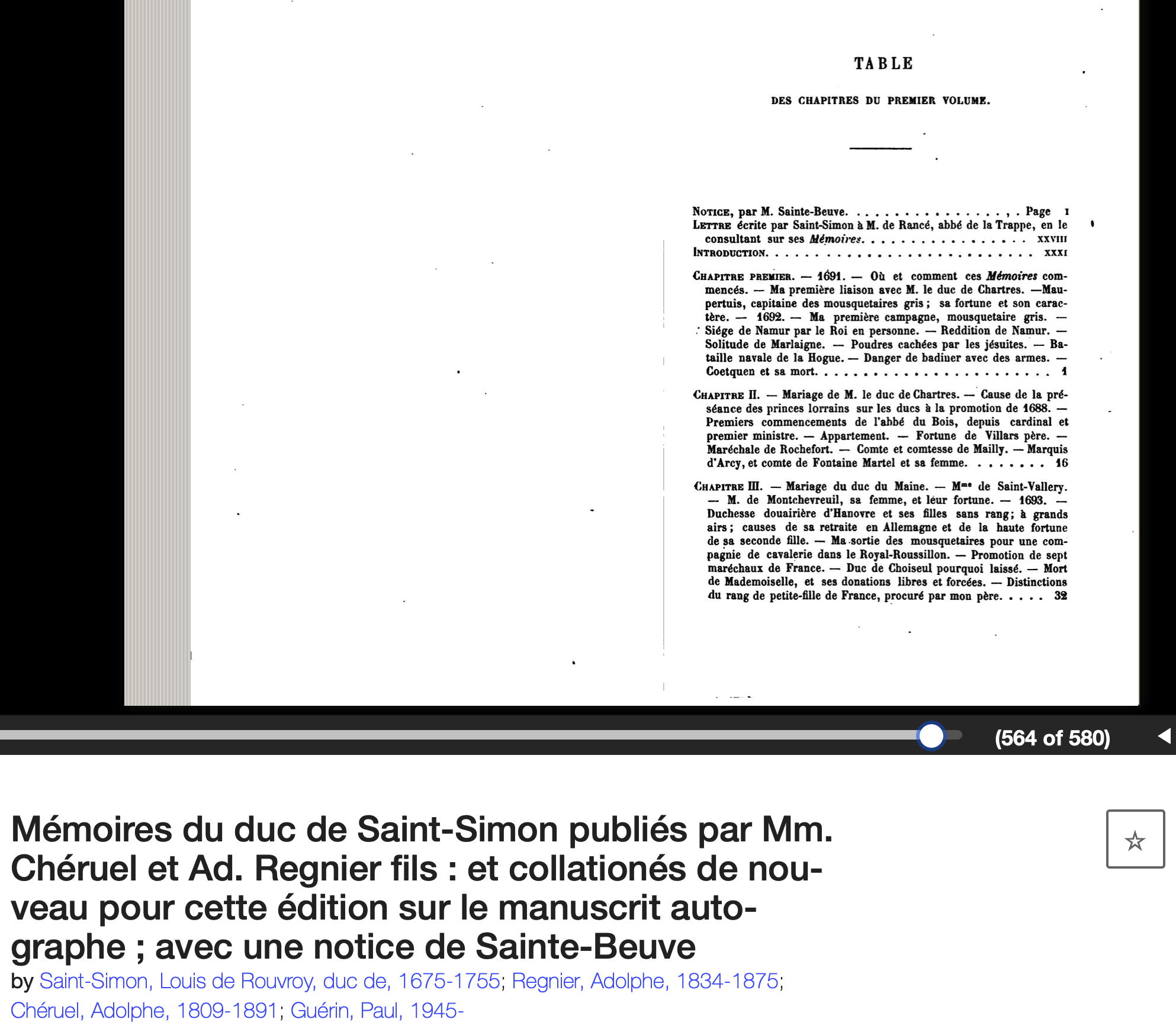
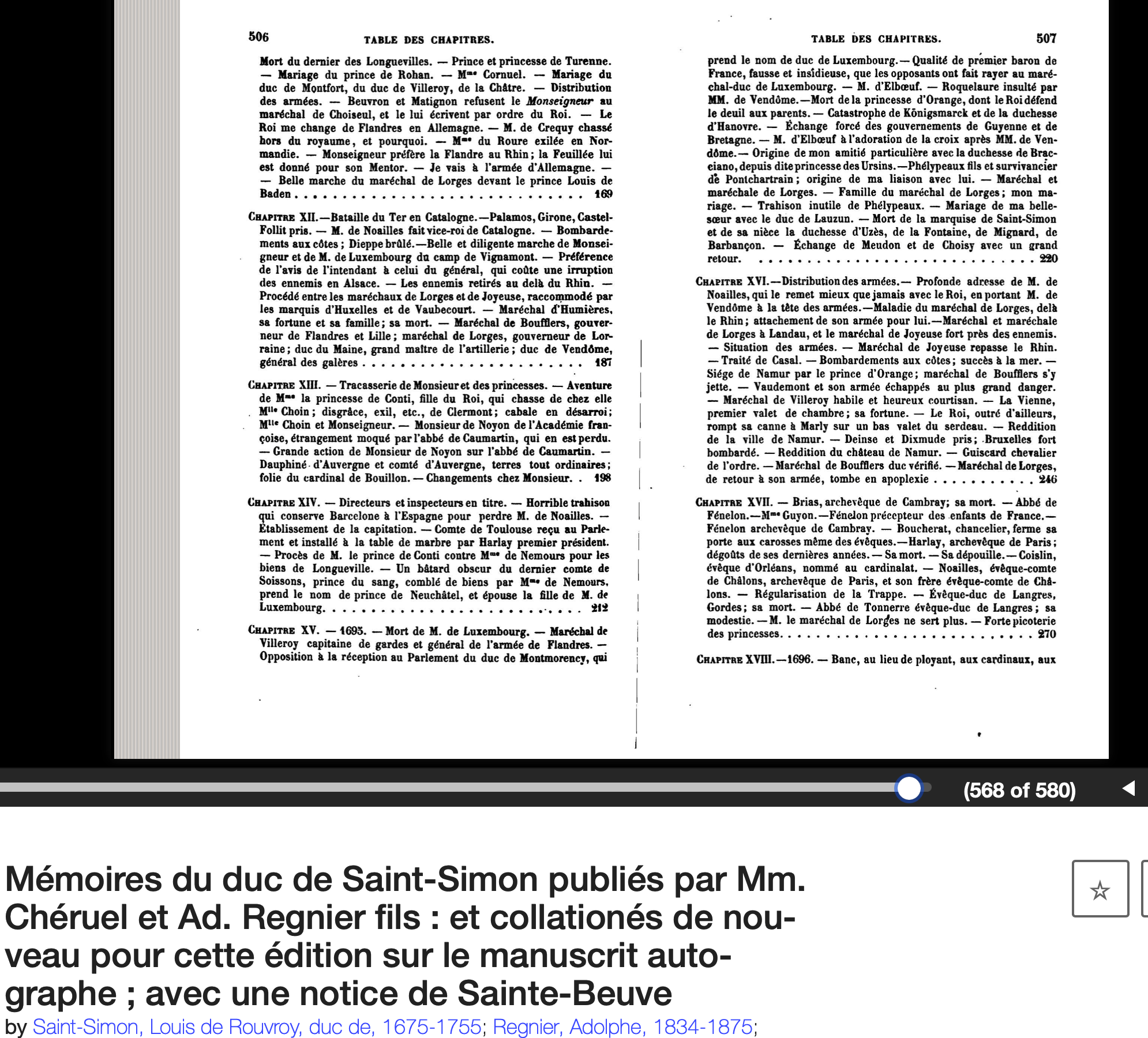
Gérard Genette, "Chapter 13 The Age of Names," in Mimologics (1995), 249-60; 398-402.
The Berma Effect
Gérard Genette, The Work of Art: Immanence and Transcendence (1997), pp. 9-10; 89-90.
Gérard Genette, Fiction and Diction (1993), pp. 26, 34, 64-65, 68, 86, 110-11,140.
Henri Mitterand, "A la recherche du style," Poétique 90 April 1992
Gérard Genette, "Chapter 16 Matter of Venice," "Chapter 17 Combray-Venice-Combray" and "Chapter 18 One of my Favorite Authors," in Essays in Aesthetics (2005), pp. 167-202.
metalepsis summary
Leland de la Durantaye, "Style Over Substance: Translating Proust," Boston Review (2014)
Erich Auerbach, "Marcel Proust and the Novel of Lost Time," in Time, History, and Literature: Selected Essays of Erich Auerbach (2016), 157-64.
Abridging Proust's syntax: Some sentences are very short, but most are unusually long, often running over 300 words. To understand one of the long sentences, you'll need to find the subject and verb (main clause) and separate it from the multiple subordinate clauses. You will also have to pay attention to Proust's punctuation.
A dungeon keep without mass, no more indeed than a band of orange light from the
summit of which the lord and his lady dealt out life and death to their vassals, had given
place — right at the end of that ‘Guermantes way’ along which, on so many
summer afternoons, I retraced with my parents the course of the Vivonne — to
that land of bubbling streams where the Duchess taught me to fish for trout and
to know the names of the flowers whose red and purple clusters adorned the
walls of the neighbouring gardens; then it had been the ancient heritage, famous
in song and story, from which the proud race of Guermantes, like a carved and
mellow tower that traverses the ages, had risen already over France when the sky
was still empty at those points where, later, were to rise Notre Dame of Paris and
Notre Dame of Chartres, when on the summit of the hill of Laon the nave of its
cathedral had not yet been poised, like the Ark of the Deluge on the summit of
Mount Ararat, crowded with Patriarchs and Judges anxiously leaning from its
windows to see whether the wrath of God were yet appeased, carrying with it the
types of the vegetation that was to multiply on the earth, brimming over with
animals which have escaped even by the towers, where oxen grazing calmly
upon the roof look down over the plains of Champagne; when the traveller who
left Beauvais at the close of day did not yet see, following him and turning with
his road, outspread against the gilded screen of the western sky, the black, ribbed
wings of the cathedral.
--Montcrieff
Un donjon sans épaisseur qui n'était qu'une bande de lumière orangée et du haut
duquel le seigneur et sa dame décidaient de la vie et de la mort de leurs
vassaux avait fait place — tout au bout de ce « côté de Guermantes » où,
par tant de beaux après-midi, je suivais avec mes parents le cours de la
Vivonne — à cette terre torrentueuse où la duchesse m'apprenait à pécher
la truite et à connaître le nom des fleurs aux grappes violettes et rougeâtres
qui décoraient les murs bas des enclos environnants: puis c'avait été la
terre héréditaire, le poétique domaine, ou cette race altière de Guermantes,
comme une tour jaunissante et fleuronnée qui traverse les âges, s'éle-
vait déjà sur la France, alors que le ciel était encore vide, là où devaient
plus tard surgir Notre-Dame de Paris et Notre-Dame de Chartres,
alors qu'au sommet de la colline de Laon la nef de la cathédrale ne s'était
pas posée comme l'Arche du Déluge au sommet du mont Ararat, emplie
de Patriarches et de Justes anxieusement penchés aux fenêtres pour
voir si la colère de Dieu s'est apaisée, emportant avec elle les types
des végétaux qui multiplieront sur la terre, débordante d'animaux qui
s'échappent jusque par les tours où des bœufs se promenant paisible-
ment sur la toiture, regardent de haut les plaines de Champagne;
alors que le voyageur qui quittait Beauvais à la fin du jour ne voyait
pas encore le suivre en tournoyant, dépliées sur l'écran d'or du cou-
chant, les ailes noires et ramifiées de la cathédrale.
--Proust, LE COTE DE GUERMANTES / The Guermantes Way
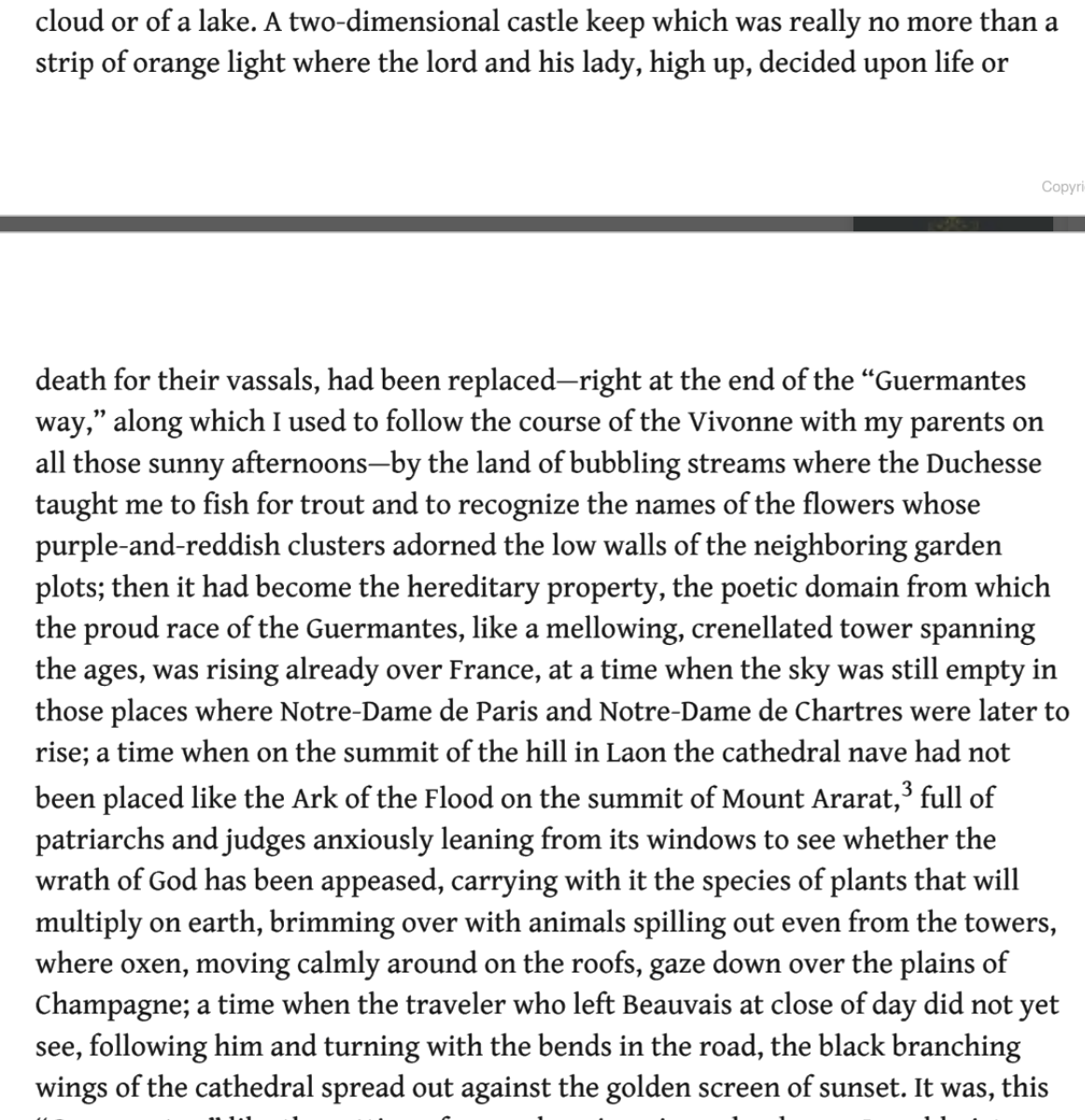
Trans. Mark Traherne
Abridging Proust's plot: In the first two chapters, almost nothing happens but the time of narration is often changes either antiapting what will come or retrospectively recalling something that happened or used to happen. Sometimes what appears to have been a singular event that happened one Sundays in the past is narrated as a recurring event that happened on Sundays.proust's synatic cards: "or . . . or because . . . or because . . . or"
In this way we place women far more outstanding than Mme. Swann on the lowest rung of the social ladder, whether on account of their origin, or because they do not care about dinner parties and receptions at which we never see them, and suppose this, erroneously, to be due to their not having been invited, or because they never speak of their social connexions, but only of literature and art, or because people conceal the fact that they go to their houses, or they, to avoid impoliteness to yet other people, conceal the fact that they open their doors to these, in short for a thousand reasons which, added together, make of one or other of them in certain people’s eyes, the sort of woman whom one does not know.
Gérard Genette on Legrandin and the palimpsest: "Proust and Indirect Language," in Figures of Literary Discourse, pp. 280-85 Translator Alan Sheridan (See the geological strata metaphor for memory.)
Genette, Gérard. "Time and Narrative in A la Recherche du temps perdu," Aspects of Narrative: Selected Papers from the English Institute, Trans. Paul de Man, edited by J. Hillis Miller, Columbia University Press, 1971, pp. 93-118.
Gérard Genette, “Metonymy in Proust,” Swann's Way (Susanna Lee, Ed. Norton Critical Editions, 2013)
Finally, this idea of Time had the ultimate value of the hand of a clock.
It told me it was time to begin if I meant to attain that which I had felt in
brief flashes on the Guermantes' side and during my drives with Mme
de Villeparisis, that indefinable something which had made me think life
worth living. How much more so now that it seemed possible to illuminate
that life lived in darkness, at last to make manifest in a book the truth
one ceaselessly falsifies. Happy the man who could write such a book.
What labour awaited him. To convey its scope would necessitate comparison
with the noblest and most various arts. For the writer, in creating
each character, would have to present it from conflicting standpoints so
that his book should have solidity, he would have to prepare it with meticulous
care, perpetually regrouping his forces as for an offensive, to
bear it as a load, to accept it as the object of his life, to build it like a
church, to follow it like a régime, to overcome it like an obstacle, to win it
like a friendship, to nourish it like a child, to create it like a world, mindful
of those mysteries which probably only have their explanation in other
worlds, the presentiment of which moves us most in life and in art.
Parts of such great books can be no more than sketched for time presses
and perhaps they can never be finished because of the very magnitude of
the architect's design. How many great cathedrals remain unfinished?
Such a book takes long to germinate, its weaker parts must be
strengthened, it has to be watched over, but afterwards it grows of itself,
it designates our tomb, protects it from evil report and somewhat against
oblivion. But to return to myself. I was thinking more modestly about
my book and it would not even be true to say that I was thinking of
267
those who would read it as my readers. For, as I have already shown,
they would not be my readers, but the readers of themselves, my book
being only a sort of magnifying-glass like those offered by the optician of
Combray to a purchaser.
magnifying-glass like those offered by the optician of
Combray to a purchaser. So that I should ask neither their praise nor
their blame but only that they should tell me if it was right or not,
whether the words they were reading within themselves were those I
wrote (possible devergencies in this respect might not always arise from
my mistake but sometimes because the reader's eyes would not be those
to whom my book was suitable). And, constantly changing as I expressed
myself better and got on with the task I had undertaken, I
thought of how I should devote myself to it at that plain white table,
watched over by Françoise. As all those unpretentious creatures who live
near us have a certain intuition of what we are trying to do and as I had
so far forgotten Albertine that I forgave Françoise for her hostility to her,
I should work near her and almost like her (at least as she used to
formerly for now she was so old that she could hardly see), for it would
be by pinning supplementary leaves here and there that I should build
up my book, so to speak, like a dress rather than like a cathedral. When I
could not find all the sheets I wanted, all my "paperoles" as Françoise
called them, when just that one was missing that I needed, Françoise
would understand my apprehension, for she always said she could not
sew if she had not got the exact thread-number and sort of button she
wanted and because, from living with me, she had acquired a sort of instinctive
understanding of literary work, more right than that of many
intelligent people and still more than that of stupid ones. Thus when I
used to write my articles for the Figaro, while the old butler with that exaggerated
compassion for the severity of toil which is unfamiliar, which
cannot be observed, even for a habit he had not got himself like people
who say to you, "How it must tire you to yawn like that," honestly pitied
writers and said: "What a head-breaking business it must be," Françoise,
to the contrary, divined my satisfaction and respected my work. Only
she got angry when I told Bloch about my articles before they appeared,
fearing he would forestall me and said: "You aren't suspicious enough of
all these people, they're copyists." And Bloch, in fact, did offer a prospective
alibi by remarking each time that I sketched something he liked:
"Fancy! that's curious, I've written something very much like that; I must
read it to you." (He could not then have read it to me because he was going
to write it that evening.)
In consequence of sticking one sheet on another, what Françoise called
my paperoles got torn here and there. In case of need she would be able to help me mend them in the same way as she patched worn parts of her
dresses, or awaiting the glazier as I did the printer, when she stuck a bit
of newspaper in a window instead of the glass pane. Holding up my
copy-books devoured like worm-eaten wood, she said: "It's all motheaten,
look, what a pity, here's the bottom of a page which is nothing but
a bit of lace," and, examining it like a tailor: "I don't think I can mend it,
it's done for, what a shame; perhaps those were your most beautiful
ideas. As they said at Combray, there are no furriers who know their job
as well as moths, they always go for the best materials."
Moreover, since individualities (human or otherwise) would in this
book be constructed out of numerous impressions which, derived from
many girls, many churches, many sonatas, would serve to make a single
sonata, a single church and a single girl, should I not be making my book
as Françoise made that boeuf à la mode, so much savoured by M. de Norpois
of which the jelly was enriched by many additional carefully selected
bits of meat? And at last I should achieve that for which I had so
much longed and believed impossible during my walks on the Guermantes'
side as I had believed it was impossible, when I came home, to
go to bed without embracing my mother, or later, that Albertine loved
women, an idea I finally accepted unconsciously, for our greatest fears
like our greatest hopes are not beyond our capacity and it is possible to
end by dominating the first and realising the second. Yes, this newlyformed
idea of time warned me that the hour had come to set myself to
work. It was high time. The anxiety which had taken possession of me
when I entered the drawing-room and the made-up faces gave me the
notion of lost time, was justified. Was there still time? The mind has
landscapes at which it is only given us to gaze for a time. I had lived like
a painter climbing a road which overlooks a lake hidden by a curtain of
rocks and trees. Through a breach he perceives it, it lies before him, he
seizes his brushes, but already darkness has come and he can paint no
longer, night upon which day will never dawn again.
A condition of my work as I had conceived it just now







































































